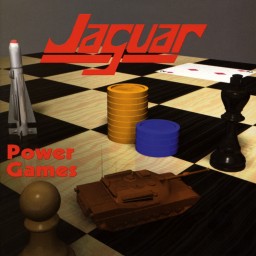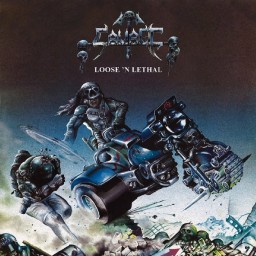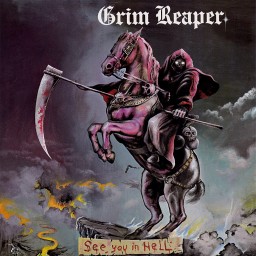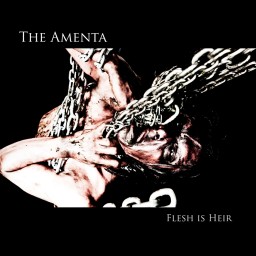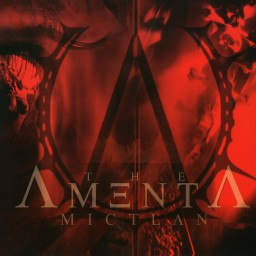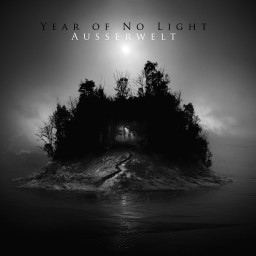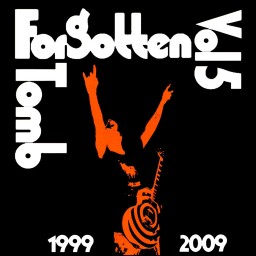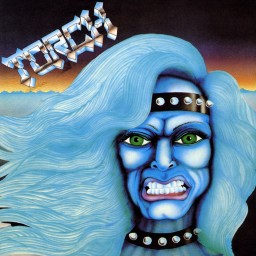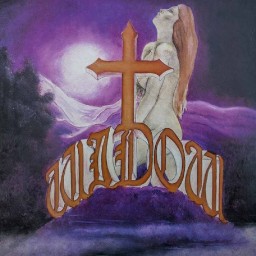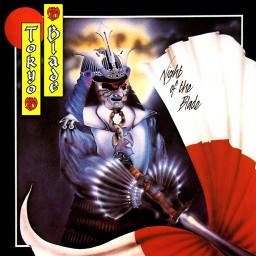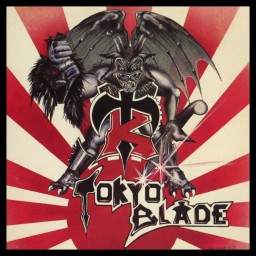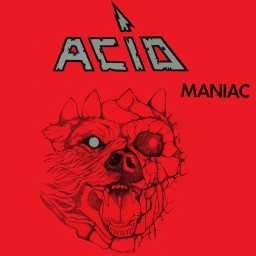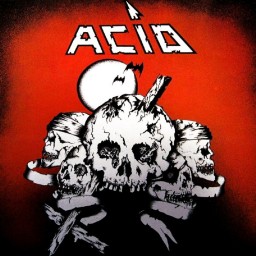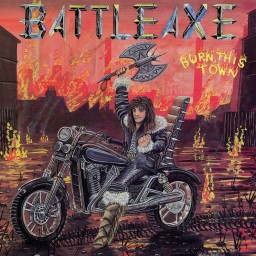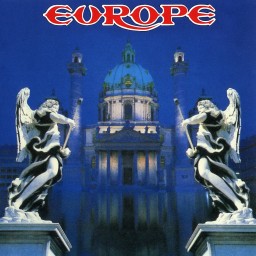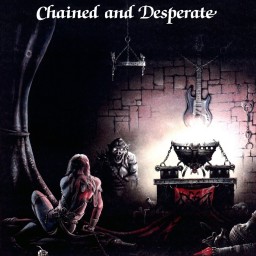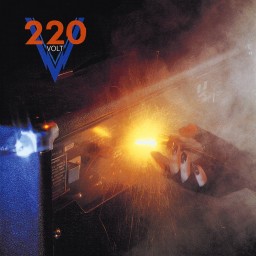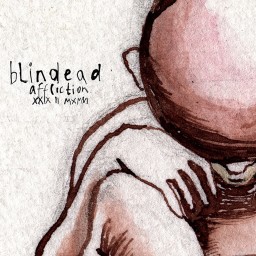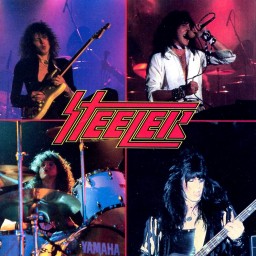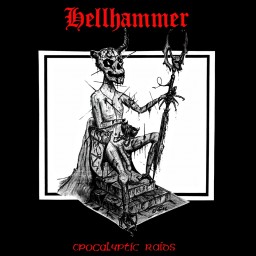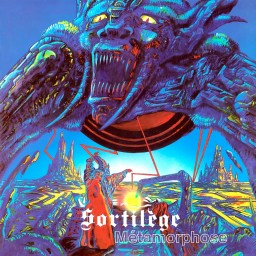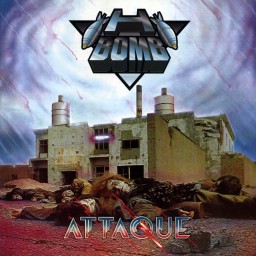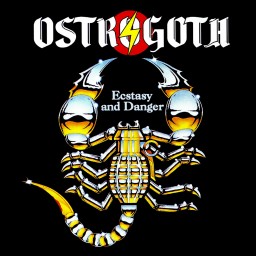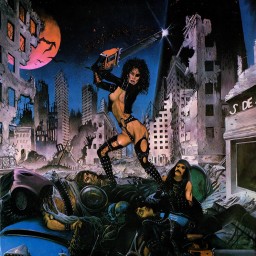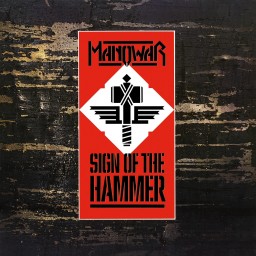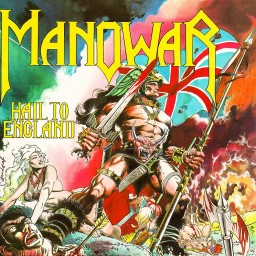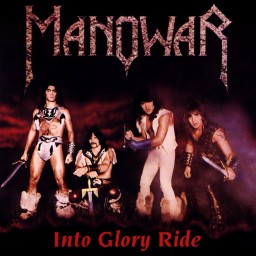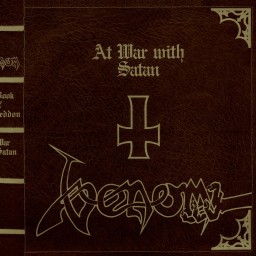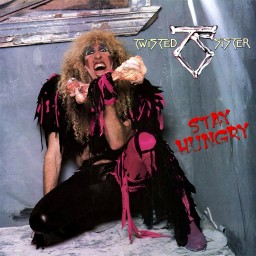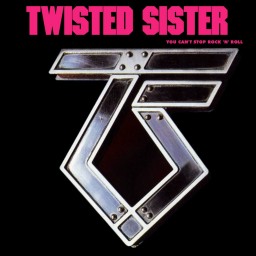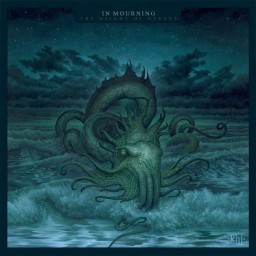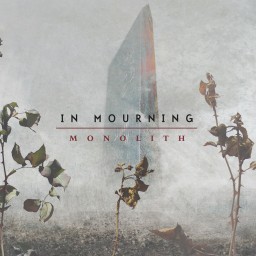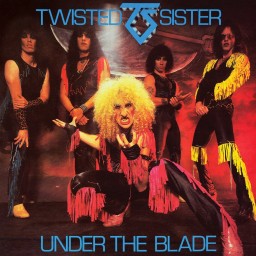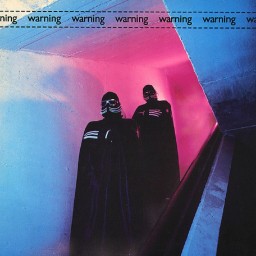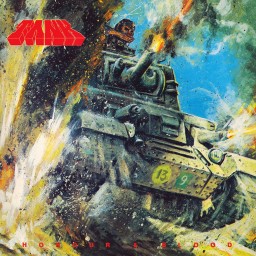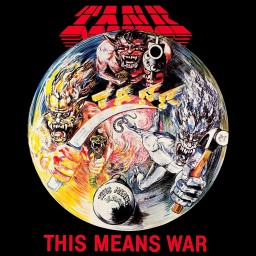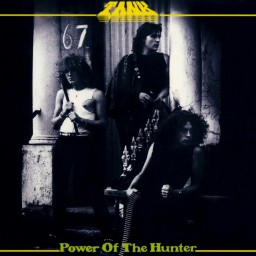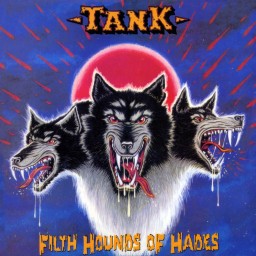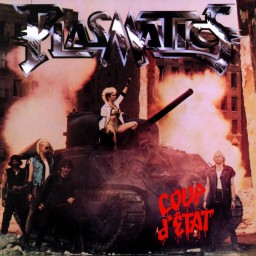Daniel's Reviews
With the NWOBHM starting to wind down a little with several important bands now starting to explore more accessible sounds in the hope of commercial success, it’s not surprising that we were also starting to see several young bands responding by heading in the complete opposite direction & keeping things raw & aggressive with a stronger emphasis on speed than ever before. Bristol-based four-piece Jaguar were one such band with their debut studio album “Power Games” being released in March 1983; a full four years after the band formed back in 1979.
The production on “Power Games” is particularly raw (even for a NWOBHM debut) but not in a bad way with the guitar sound being heavily distorted & very much in-you-face. It really suits Jaguar’s sound in my opinion. In fact, so many of these speed metal influenced bands of the time tended to end up with noisy productions that comfortably made up for their lack of clarity with unbridled enthusiasm & energy. Jaguar are not the type of band you listen to if you’re looking for flashy virtuosity or progressive extravagance anyway though. They’re a no-frills heavy metal band that doesn’t muck around with unnecessary nuances. Even the guitar solos are kept quite minimal & simple with a stronger emphasis placed on song-writing & bludgeoning the listener than showcasing anything too showy. Bass player Jeff Cox is probably the highlight instrumentally & I quite enjoy his style. He adds something fresh to these songs & isn’t afraid to contribute some melody here & there. Vocalist Paul Merrell has a really great voice too. He sounds a lot like Foreigner’s Lou Gramm & that can’t be a bad thing as I’ve always admired Lou’s voice.
Musically, Jaguar have listed the likes of Black Sabbath, Budgie, Judas Priest, UFO & Iron Maiden as their primary influences although I’d suggest that it would be more accurate to say that their sound sits somewhere between Iron Maiden's self-titled debut & the high velocity electricity of Raven with a strong punk & hardcore element thrown in for good measure. It’s pretty hard to deny the impact that the likes of the Ramones & the Sex Pistols had on the band on the evidence here. I mean a song like “Prisoner” is pure hardcore punk in my opinion while the rest of Jaguar’s material alternates between traditional NWOBHM fair & the exciting new sounds of legitimate speed metal, although I’d probably suggest that they sit more comfortably under the heavy metal banner overall. To be fair though, the faster songs are some of the fastest the metal world had heard to the time.
The song-writing is very consistent with only the one blemish. I’m actually surprised that Jaguar didn’t make more of an impact on the scene of the time because this is a more than decent heavy metal album. Perhaps Jaguar just arrived a little too late in the game.
Genres: Heavy Metal
Format: Album
Year: 1983
The appropriately named Nottinghamshire-based four-piece NWOBHM outfit Savage first formed way back in 1976 but split shortly afterwards following just the one solitary live show. 1978 saw the band reforming with a different lineup but as with most young New Wave bands the next few years saw a continual procession of lineup changes halting the band’s progress. But a few minor demo & single releases in the early 80’s saw Savage finally starting to get their shit together with 1983 marking the release of their first full-length album entitled “Loose ‘n Lethal”. It came right at the back end of the NWOBHM movement & is the sort of record that makes you stand up & pay attention. Once you hear it I’m pretty sure you’ll agree that “Loose ‘n Lethal” was a pretty suitable title.
The main element of Savage’s sound that people immediately pick up on is of course their over-the-top guitar sound which is nothing short of…. well… SAVAGE! I don’t think the world had heard guitars sound so completely out of control before with the distortion level set to 11 & the excessive volume levels in the mix providing even more distortion. In fact, you’ll find that the vocal performance of bass player Chris Bradley regularly gets dragged into the wall of guitar noise with his voice often displaying signs of distortion. Chris’ voice could be described as fairly typical of the New Wave. He’s not an enormous talent but he gets the job done. The same could be said for lead guitarist Andy Dawson actually as he’s clearly chosen the school of speed & ferocity over the college of virtuosity & melody. He just goes absolutely ape shit on every solo & doesn’t seem to have much structure or focus to what he does but it ends up sounding pretty cool nonetheless.
It’s interesting that Savage are often credited with influencing the thrash metal genre however I’m gonna be a bit controversial here (a shock for you all, I know) & say that there’s really very little proto-thrash or speed metal on offer here. In fact, it’s really only the guitar sound & the iconic opening track that can be considered to be influential on the more extreme forms of metal. "Let It Loose" has been brought to most people’s attention through the influence it had on a young Metallica who have covered it in various different capacities over the years. It’s clearly the fastest & most extreme song on offer with Motorhead’s more violent speed metal material being the primary source of influence. The rest of the material just benefits from the guitar sound which manages to make simple hard rock riffs sound like some ball-tearing metal. And honestly there’s a fair bit of hard rock about some of these songs. In general I’d compare Savage to fellow underground NWOBHM acts like Raven, Chateaux & Jaguar who were all pushing the limits of heavy metal extremity in their own ways but the most obvious influence I can hear on Savage’s sound is actually David Lee Roth-era Van Halen. In truth there’s a fair bit of Van Halen plagiarism going on in the riff & lead break departments. Just check the main riff from “White Hot” out & compare it with the riff from Van Halen’s “Unchained” for one of the many examples.
But thankfully I can look past all that because the energy & electricity of Savage’s music makes for a unique & interesting listen with only the one flat track amongst the eight on offer. I think they’re just lacking those couple of real classics to push “Loose ‘n Lethal” up into the essential listening category but as it is I’d still recommend that all fans of the NWOBHM give it a few spins.
Genres: Heavy Metal
Format: Album
Year: 1983
Grim Reaper were a four-piece NWOBHM outfit from Worcestershire, England that formed in 1979 & just managed to slip this debut studio album in on the tail end of the New Wave movement. Those of you that are familiar with Chateaux’s 1983 debut album “Chained & Desperate” would already be acquainted with the enormous talent of front man Steve Grimmett due to his having taken the mike on that particular record in a purely guest capacity. Steve ended up being the best thing about that album which is one that I regard as being a pretty strong debut but despite the high quality of Chateaux’s first-up effort, Steve didn’t want to commit to a full-time role with the band as his heart lay primarily with his main band. Whether you agree that this was the best decision or not is open for debate however there is little doubt that both records showcase some pretty high quality NWOBHM material.
The first thing you’ll notice about Grim Reaper’s debut “See You In Hell” is the striking artwork which depicts the Reaper himself riding high atop a mighty steed & wielding a huge death scythe. It’s a particularly metal image & one that I strongly suspect was plagiarized from some famous artist that I'm completely ignorant of. Well it’s not a bad representation of what you’re about to hear because “See You In Hell” is undoubtedly a very metal release. In fact, so much so that it’s perhaps the album’s major weakness because it can come across as pretty basic & meat & potatoes.
The production does the job OK but you could certainly argue that the rhythm guitar sound is a bit muddy. I don’t think it detracts from the listening experience though. Steve’s vocals are a touch loud in the mix too but I’m not really surprised because he’s the clear drawcard here. I absolutely loved his performance on the Chateaux record & he once again shows why I’m such a big fan although possibly not to quite the same extent. His voice is very powerful & he can really scream with David Coverdale from Deep Purple & Whitesnake being the obvious reference point.
The song structures are generally pretty simple with the traditional verse/chorus arrangement being the order of the day. This isn’t the riffiest of metal bands either. They favour simple power chord progressions as often as not with a higher emphasis placed on accompaniment in order to maximize the song-writing. And that’s where the strength of “See You In Hell” becomes obvious. The anthemic singalong vocal hooks are there on most songs & when you’ve got a singer that’s as strong as Grimmett you’d be crazy not to try to milk them for all they’re worth.
The guitar solos don’t tend to be too flashy & they go for a more melodic approach for the most part. I would guess this is as much out of necessity than it is a conscious decision because I’m not sure guitarist Nick Bowcott is the most talented shredder out there. Drummer Lee Harris is definitely the weaker link in the band though. Particularly his kick drum work which is pretty dodgy it has to be said but none of that matters too much. This record is all about the vocal hooks though & with the exception of a couple of dud tracks (including the long & boring ballad “The Show Must Go On”) I’d be surprised if you aren’t singing along with at least a couple of these anthemic songs after a few of listens.
If you like Deep Purple, Judas Priest & Dio-era Black Sabbath then you’ll definitely find a lot to like about “See You In Hell” & that’s never more obvious than on the closing title track which was the breakthrough song for the band. Much like the rest of the album, "See You In Hell" consists of some good solid meat-&-potatoes heavy metal that doesn’t try to over complicate things & works to its strengths.
Genres: Heavy Metal
Format: Album
Year: 1983
I was always a big fan of this band. Their first two albums were outstanding examples of industrial-edged death metal & their live shows were a true spectacle. I class them as my personal favourite from the more recent crop of Aussie metal bands so I had very high hopes for this release & it certainly didn't let me down. In fact, they stepped it up to another level altogether.
The production is better than ever before & it presents the songs in the best possible light. If you don't like triggered drum sounds then read no further because they don't get much more mechanized & up-front than this. It really does enhance the industrial vibe though & the drumming is a real highlight. This is some of the most extreme metal you will find anywhere. Stylistically they sit somewhere between Damaged, Anaal Nathrakh & Godflesh. It's extremely dark & chaotic with the electronic component adding to the insanity of the atmosphere. The slower sections are outstanding & push this dark atmosphere even further. They've included a couple of high quality industrial tracks evenly distributed amongst the metal tracks to give you a little respite from the non-stop assault on your senses & they fit the purpose well.
I honestly can't fault this album. Amazing!
Genres: Death Metal Industrial Metal
Format: Album
Year: 2013
This 7" single was The Amenta's debut release & it showcases an extreme metal band that was already a very professional outfit even though they hadn't quite found their trademark industrial death metal sound yet. All of the elements are there but I don't think they'd quite figured out how to integrate their industrial influences into their death metal platform at this point. We would have to wait until 2008's "n0n" album to see that potential fully come to fruition however the early material filled that gap with a youthful energy that made just as much impact.
The two metal tracks included here were later re-recorded for their 2004 debut album "Occasus" however the rawer production on offer here gives them a slightly different feel. Opening title track "Mictlan" is the clear highlight with it's uncompromisingly brutal attack which reminds me heavily of faster Morbid Angel material like "Dominate". "Ennea" follows on in a similar fashion & both tracks incorporate the subtle use of keyboards/samples to add atmosphere; a factor that works as a nice differentiator to distinguish The Amenta from the multitude of blasting extreme metal bands out there. Closer "Nekvia" is a short industrial piece that's as classy as it is abrasive.
"Mictlan" was a very promising introduction to a band that went on to become a favourite in the Sydney metal scene. It's hardly essential as it doesn't offer much in the way of exclusive material but it will certainly interest fans of The Amenta's later material.
Genres: Death Metal
Format: EP
Year: 2002
An absolutely crushing release that is at times almost overwhelming in it's depth. The atmosphere that this creates is immense. I'm not familiar with their previous work so the lack of vocals was very refreshing to me. I can only imagine just how loud these guys would be live with so much noise. The drummer is seriously giving those symbols a belting. I must admit that I could've done without the faster drumming sections in the 3rd & 4th tracks which is kinda messy but maybe it'll grow on me. I have heard so much ambient music that has similar structural elements to this album. Possibly the heaviest album of 2010!
Genres: Sludge Metal Post-Metal
Format: Album
Year: 2010
I dunno what to make of this to be honest. I'm not terribly familiar with Forgotten Tomb (I've only heard their debut album "Songs To Leave") but they just seem to be missing something & come across as a little flat to me. I think it's a touch of class that they're lacking. The three cover versions (Black Sabbath, Discharge & Nirvana) are all fairly unnecessary & seem to detract from the atmosphere of the other tracks if anything. I only really find myself digging a couple of tracks which both reside on the second CD ("Entombed By Winter/House Of Nostalgia" & "Scars"). Both of those tracks seem to have a heavier sound to the rest. Everything else just floats past without making much of an impressive. The vocals are fairly weak & monotonous & need some variation. There's nothing really wrong with this but there's also not much to recommend it either. For the diehard fans only.
Genres: Black Metal Doom Metal
Format: Album
Year: 2010
Hell yeah!! This is how metal should be. "Morte(s) Nee(s)" is one huge wall of sound with a suitably raw production that really enhances the atmosphere these Frenchmen create. Shrieking vocals & buzzsaw guitars are the order of the day here. These guys have energy to burn. Black metal, sludge metal & post-hardcore are all strong influences without ever taking over completely. There is not a weak moment. I can't imagine what these guys are like live. If you like your music to the absolute extreme then Celeste come highly recommended.
Genres: Sludge Metal
Format: Album
Year: 2010
1983 saw a real upsurge in the contribution of the Swedes as far as classic heavy metal releases go with the likes of 220 Volt, Europe & Heavy Load all releasing noteworthy records however the self-titled debut album from five-piece Eskilstuna outfit Torch is my pick of the bunch. Torch first formed under the name Black Widow back in 1979 but changed their moniker the following year when they replaced their bass player & vocalist. The new outfit released a five track E.P. by the name of “Fire Raiser!!” in 1982 which went on to be a lot more popular than anticipated & subsequently impressed their label enough to convince them to finance a full-length album. Torch’s debut album was recorded in the same studio & with the same producer as the E.P. & was released the following year in 1983.
If you take a look at the cover art it’s unfortunately quite easy to dismiss Torch without ever giving them a chance as it’s an absolute shocker. The title of the album was always intended to be “Sinister Eyes” & the label employed the same artist that did the cover art for the E.P. to do the artwork for the album based on that concept. The idea was that he was going to paint a picture of a beautiful woman who had the misfortune of possessing some evil looking eyes but when Torch got the chance to see the final product they were horrified as the result looks more like an angry blue metal chick neighbor who has come to your front door to complain after being woken up by the loud grindcore blasting from your home stereo at an ungodly hour. And the band rightfully rejected it of course but the label had their hearts set on it & ignored their pleas for mercy. In fact, they celebrated with the artist & by all reports you can actually see whiskey stains on the artwork if you look hard enough. To add insult to injury the album title was completely forgotten & we ended up with the cover art we see today & a self-titled record.
Thankfully the music contained within the album is high quality, well performed & particularly metal. It’s not the most ground-breaking of releases with Torch opting for a tried & true classic heavy metal sound that’s high on Judas Priest influence but it’s extremely consistent with no weak tracks included. Musically, Torch keep things pretty simple by taking a no-fuss approach to their song-writing. The performances are all quite strong with Torch taking advantage of what was a very good production for the time. None of the musicians look to push their technical limitations here. They prefer to stick to what they’re good at & it pays off in my opinion. There’s a strong focus on what is best for the songs with the guitar solos being kept short & sweet so as not to intrude on the vocal & guitar hooks & there are no unnecessary excesses to be found in the arrangements. I find drummer Steve Streaker’s use of double kick to be one of the musical highlights as he employs it a lot more regularly than most metal drummers of the time. But the main talking point of Torch’s sound must surely be the vocals as singer Dan Dark sounds EXACTLY… AND I MEAN EXACTLY… like Iron Maiden front man Bruce Dickinson; so much so that it caused me to feel the need to investigate whether it actually WAS him. And when you add that element to a pretty strong heavy metal band with a noticeably NWOBHM influenced sound & a good production it makes for a fun & rewarding listen; if not a life-changing one. All Priest & Maiden fans will surely find something to enjoy here.
Genres: Heavy Metal
Format: Album
Year: 1983
This 1983 debut album from London three-piece heavy rockers Ritual is quite an unusual & interesting release for the NWOBHM. Ritual actually formed way back in 1973 & took a full decade to get their recording career underway but you can definitely hear that in their sound as this is not your usual Iron Maiden or Saxon clone. Ritual’s sound is much more organic than the more modern & flashy metal music that was popular at the time & has clearly been built predominantly around warmer 70’s influences.
Although they unquestionably deserve their strong ties with the NWOBHM scene, it’s actually debatable as to whether Ritual are a legitimate metal band or not. There’s arguably more hard rock here than genuine metal but that's not a criticism because the band certainly possessed a pretty unique feel. This is some particularly dark music sporting a sombre atmosphere & lyrical themes based predominantly on the occult. At no stage do the band members really try to shred. They’re much more comfortable laying down deep layers of moss-covered doom rock with a noticeable psychedelic component to the guitar playing. In fact, we’ve heard a real revival of this sound over the last decade or so but this was the genuine article.
I actually think I might find this record to be much more metal if not for a strange production job that sees the guitars sitting miles too far back in the mix. The bass guitar is much louder & all of the instrumentalists need to contend with a thick layer of hissy analogue tape noise that only adds to a general feeling of authenticity in my opinion. Most bands wouldn’t be able to recover from this sort of dodgy production job but strangely it seems to suit Ritual even though it sucks nearly all of the heaviness out of their music.
The musicianship is nothing special but it doesn’t need to be, as this record is more about atmosphere than the actual performances. Guitar-slinging front man Gypsy Re Bethe sounds like he might be the older brother of Diamond Head singer Sean Harris in that he decorates each song with inventive vocal phrasings that aren’t usually equated with metal, only with a deeper register than the whiny Harris. His lead guitar work is where the psychedelics come into play & I get the distinct feeling that The Doors were a strong influence as his style is quite controlled but clearly targeted towards drawing a more cerebral reaction from the listener.
The two best songs are clearly the doomier numbers with both of them paying obvious homage to the title track from Black Sabbath’s “Heaven & Hell”. I also hear a lot of classic early 70’s Sabbath here & there’s one track that makes no attempt to hide a clear Motorhead influence too. The more rockin’ tracks often have a bit of a bluesy boogie feel goin’ on at times but not in a bad way. It’s actually kinda cool & I find a lot to like about “Widow”. It’s a real shame that it took the band so long to get going because I bet they were an awesome live act & they definitely represented something a bit different for the NWOBHM.
To add to Ritual’s troubles there was a major error made in the printing of the album covers which saw a good half of the sleeves being released minus the band name so many potential fans may have given “Widow” a miss thinking that it was in fact a record from Ritual’s NWOBHM counterparts Widow. That’s a pretty bloody huge mistake & you would have thought that it could have been resolved before too much harm was done but apparently not. I suspect that it didn’t prevent a young Metallica from picking up a copy though because when you hear the opening riff from the song “Rebecca” it's very hard to deny the similarities with the main riff from Metallica’s “For Whom The Bell Tolls”. Ritual’s performance was admittedly very sloppy but I don’t think I’m out of line to assume that this was plagiarism.
There is some enjoyable stuff on this record & I think it manages to transcend it’s production issues. If you enjoyed Witchfinder General & Pagan Alter's early records then I’d recommend you check this out too.
Genres: Heavy Metal
Format: Album
Year: 1983
The 1983 self-titled debut album from Salisbury five-piece heavy metal outfit Tokyo Blade had seen them firmly entrenching themselves within the unfortunate group of bands that only just managed to sneak in on the back end of the NWOBHM movement. And while the band certainly showed potential, there were a number of major flaws on that record that I found impossible to look past. Most notably the shocking production, the blatant Iron Maiden plagiarism & the unnecessary extension of their track lengths; particularly during the guitar solos which seemed to go on & on with little development in the accompaniment. So overall, I found that first record to be overrated & disappointing. But that brings us to 1984’s follow-up release entitled “Night Of The Blade”; an album that saw Tokyo Blade taking a much more polished & professional approach to their music & one that features some notable characteristics that have polarised some of their fan base.
Now it’s worth highlighting up front that even though he doesn’t appear on the final product, original Tokyo Blade front man Alan Marsh was still a part of the band right up until the recording of the album was completed. In fact, the whole album was done & dusted before Tokyo Blade’s record label Powerstation Records decided that the recording could benefit from a more commercially accessible front man like Van Halen’s David Lee Roth & proceeded to unceremoniously dump poor Alan. You wonder if that sort of thing could still happen these days, don’t you? I mean, do record labels still possess that sort of power? I suspect not but regardless… 17 year-old Vic Wright was cherry-picked as Alan’s replacement & he was promptly tasked with re-recording all of the lead vocal tracks in a very short space of time with only Alan’s backing vocal tracks left intact. I have to say that I think the change ended up having the desired effect because Vic definitely brings a level of polish & accessibility to Tokyo Blade’s sound. His delivery reminds me of Guy Speranza (the vocalist from the classic lineup of US heavy metal icons Riot) & he brings some quite similar things to the table really. Vic possesses a genuinely pure & natural singing voice that definitely works to open this material up to a new audience which was clearly the label’s intention.
The production job is a huge improvement on the debut as it sports a cleaner & more professional sound with a glossier edge to it without ever losing its ties with its NWOBHM roots, so the band now had no excuse for failure. Those guitar solos I mentioned earlier have been shortened & tailored more towards what suits the song-writing this time which is a big improvement while the accompaniments now have more variety too. Both guitarists are very capable with the Eddie Van Halen influence that was so evident on the debut still being quite visible here.
But probably the most talked about aspect of “Night Of The Blade” is in the overall style of the music. Whereas the debut focused all of its attention on jumping on the Iron Maiden band-wagon, the follow-up sees Tokyo Blade venturing further afield. There are a couple of tracks here that are pretty close to genuine speed metal while on the other side of the coin we see the couple of more commercially focused songs falling straight into the US glam metal bucket with the rest of the material sitting somewhere in between. Sadly, I’ve noticed that most reviewers tend to concentrate on the more commercial aspects of the album which is unfair in my opinion. Sure there’s a hefty dose of the poppier Van Halen & Dokken output in songs like “Rock Me To The Limit” & closing number “Lightning Strikes (Straight Through The Heart)” in particular but the rest of these songs all have more of a classic heavy metal feel to them that's not too dissimilar to Riot’s “Fire Down Under” album. It’s a fair way from being the obvious attempt at Def Leppard arena success that so many seem to label it as. The Iron Maiden influence is still a part of the Tokyo Blade sound but it’s nowhere near as strong as it was. “Warrior Of The Rising Sun” would be the obvious exception to the rule but it’s a very solid track in its own right so it can be forgiven.
Overall, I find "Night Of The Blade" to be a big step up from Tokyo Blade’s self-titled debut & it's also a pretty enjoyable listen despite the few weaker numbers included. I'd recommend it to fans of the NWOBHM.
Genres: Heavy Metal
Format: Album
Year: 1984
Tokyo Blade were a five-piece NWOBHM outfit who formed in Salisbury, England in the late 70’s. They went through several name changes over the next few years before settling on their final moniker & eventually found their way into the studio to lay down their self-titled debut album which was released in 1983. Now I don’t know about you but the name “Tokyo Blade” didn’t tend to instill a lot of confidence in me & I have to admit that I was half expecting to hear some sleezy glam metal upon first listen. But that didn’t end up being the case & I was pleasantly surprised to find that Tokyo Blade were pushing a more traditional NWOBHM sound & quite a metal one too. But one thing that DIDN’T leave me pleasantly surprised was the production as it sounds much more like a demo than a proper album release. The guitar sound is certainly very metallic but if I had to guess I would say that the record was recorded completely live in the studio with no overdubs because one of the rhythm guitars drops out during every guitar solo leaving an awful gap in the sonic spectrum. And the levels of the two guitarists are also unbalanced at times with one sounding much louder than the other which is kind of inexcusable if you ask me. It’s a very raw recording but that’s not to say that it’s unlistenable by any stretch of the imagination.
The two guitarists actually possess some very impressive technical skills & the lead guitar work & heavy, well-structured metal riffs are very entertaining for the most part. In fact, they’re definitely the highlight of the album in my opinion. The same can’t be said for Alan Marsh’s vocals however as he puts in a very patchy display indeed. He’s clearly not a big vocal talent but the couple of songs that I enjoy are inevitably the ones where Alan manages to hold it together the best. It’s a really inconsistent performance by him actually as I have no problem at all with some of these tracks & then he sounds well out of his depth & quite pitchy on others. The rhythm section doesn’t do anything terribly interesting & the drummer’s use of kick drum isn’t really up to scratch but that’s not a major concern. Classic heavy metal is really all about loud guitars & anthemic vocal hooks & Tokyo Blade have one but not the other.
I suspect that they were also a bit short of material for this record because it’s really pretty obvious that they’ve tried to extend each song far beyond the length that they should naturally run for with the guitar solos being especially guilty of needless self-indulgence. Look, being an obsessive guitarist I clearly love my guitar solos but if you’re going to double the length of your solo then you also need to keep your backing track interesting by utilizing changes of riff or key & Tokyo Blade clearly haven’t realized that because they just continue on with the same riff & drum beat for what seems like an eternity while their band mate burns away over a greatly diminished backing due to the lack of his rhythm guitar track. You can tell I’m a bit annoyed by it because I can hear the promise in this band. They’ve actually got a good energy about them & understand what the NWOBHM was all about. It’s just a shame that they didn’t have the technical knowledge to pull it off in the studio. I suspect they probably slayed live though.
Iron Maiden is clearly Tokyo Blade’s major influence but they don’t sound like they’re plagiarizing them at any stage. The more accessible tracks also give off an early Def Leppard vibe at times too with one of their songs even being entitled “On Through The Night” which was the name of Def Leppard’s 1980 debut album. But the flaws here mean that I unfortunately won’t be recommending Tokyo Blade’s debut. It sounds very much like a work in progress at this point & you're left with the distinct feeling that Tokyo Blade's next record could be much better (which it was).
Genres: Heavy Metal
Format: Album
Year: 1983
1983's self-titled album saw Belgian five-piece Acid kickstarting their career in fine fashion with one of the earliest legitimate speed metal releases of any note (see Exciter's "Heavy Metal Maniac" for the other). Well Acid wasn’t satisfied with resting on their laurels & not only did they manage to record & release their sophomore record later in the same calendar year but they also managed to top it with an album that’s faster, more aggressive & more professionally put together on all levels.
“Maniac” sees Acid’s sound showing signs of development over the rawer debut which was roughly a 50/50 proposition with regards to speed metal & Acid’s earlier traditional heavy metal sound. “Maniac” on the other hand is more like three quarters speed metal with drummer Anvill continuing to pound away on his double kick in worship of Motorhead’s Philthy Phil Taylor throughout most of this material in exciting fashion. Female vocalist Kate sounds a little more aggressive here too as she spits out her lyrics in a slightly more spiteful fashion while the production is cleaner, thicker & more powerful than the one we heard on the debut. The metal audience had been hearing some pretty raw examples of speed metal production to that time& I guess that stems from the Motorhead & Venom influence but this cleaner sound is pretty much spot on for speed metal in my opinion. I prefer to be able to hear all the nuances & let the song-writing do the talking rather than having to rely on raw intensity all the time. The guitar solos are probably the weak point of the album as they lack authority & don’t really serve much purpose but they’re relatively short & fly by without you noticing too much.
Interestingly, my favourite track from the debut was one of the more traditional heavy songs in the anthemic ode to being a metalhead “Hooked On Metal” & once again my two favourite numbers are probably the couple with a more classic metal sound. In fact, the slowest track on the album, “Prince Of Hell & Fire”, is absolutely brilliant & is the clear album highlight in my opinion. It’s got a dark Judas Priest meets Black Sabbath feel to it with plenty of space & a ploddy brooding tempo ala Sabbath’s “Heaven & Hell”. Amazing stuff! There is the one blemish on the tracklisting however in the punky speed metal track “No Time” which sounds half-baked to me but the other seven songs are all worth listening to.
Fans of Exciter or the faster Motorhead, Venom, Raven & Judas Priest material will definitely get into this album. It’s high quality stuff indeed. In fact, I'd suggest that it was the strongest speed metal record the world had seen to the time.
Genres: Heavy Metal Speed Metal
Format: Album
Year: 1983
Acid were a five-piece speed metal outfit who formed in the city of Brugge in Belgium back in 1980 with their debut self-titled album eventually being released in 1983. It had been a while since the metal underground had heard any major contributions coming out of Belgium by that stage & we'd have to look back a few years to Killer’s 1980 debut album “Ready For Hell” to find the last release of any significance. But there was more to Acid than just another run of the mill heavy metal band. Not only were they noteworthy for being amongst the very first speed metal outfits but they were also one of the few metal bands to include a female vocalist at the time which is interesting.
Acid’s self-titled debut album was released in January 1983 & it featured a raw production that emphasizes the energy & enthusiasm of the young band & I feel that it perfectly embodies what Acid were trying to achieve. A cleaner production would likely have nullified some of the youthful exuberance that was one of Acid’s main strengths in my opinion & the sound here offers the listener a much more honest portrayal of what the band were really about. You can still hear all of the instruments perfectly well but the rough edges are almost celebrated at the same time.
The musicianship on display is fairly basic & you’re not going to be blown away by extravagant solos or overly technical riffs. That’s not the point of this music. It’s primarily focused on simple & traditionally structured songs at high velocity. Having said that though, drummer Anvill employs some impressive double kick work throughout the album & he was clearly heavily influenced by Philthy Phil Taylor from Motorhead in that regard. He just takes that element of Phil’s playing & explores it a little more comprehensively than Phil ever did. Vocalist Kate is a really great front woman in my opinion. Her delivery achieves a beautiful balance of melody & aggression & has a noticeably bad ass quality to it that I find very appealing. She’s the main drawcard for Acid really & if you like her you’ll like this record. Her lyrics are really pretty childish & basic but that’s obviously been contributed to by the fact that English was not the band’s first language & I actually find this element to make Acid even more appealing as it adds an endearing quality to the overall package.
Not all of the songs here are flat out. There are a few more traditional heavy metal songs scattered across the tracklisting as Acid actually started out with a more traditional sound but the majority of the material is pretty much pedal-to-the-metal. Punk rock was unquestionably an influence on the band & that can easily be detected in the attitude that Kate exudes. But the primary influences I can pick up are Motorhead, Venom, Judas Priest & Raven which is not surprising as these bands are generally regarded as the Godfathers of speed metal. The tracklisting is very consistent with only one of the ten songs not appealing to me. These songs are simple & accessible but vicious & exciting at the same time. The only thing that’s probably lacking is the inclusion of a couple of real classics as this is all good stuff but it likely won’t find its way onto anyone’s best albums charts. The very catchy "Hooked On Metal" is probably my pick of the bunch. It’s not one of their faster efforts & sits more comfortably under the banner of traditional heavy metal but it’s annoyingly catchy & infectious even though it is pretty dumb from a lyrical point of view. But then again… we’re metalheads! When did we start caring about shit lyrics??
"Acid" is a fun, refreshing & engaging listen that should appeal to all speed metal fans.
Genres: Heavy Metal Speed Metal
Format: Album
Year: 1983
This debut release comes from a four-piece outfit from Sunderland, England who began life under the name of Warrior in 1980 before later swapping to the slightly cooler & metal-as-fuck moniker of Battleaxe. The band initially cut their teeth in the local live music scene & worked hard on developing a tight, heavy & well-defined sound before recording a demo tape by the name of “Burn This Town”. Thankfully Roadrunner Records liked what they heard & agreed to release the first full-length Battleaxe studio album (also entitled “Burn This Town”) in 1983. And it’s this release that we’ll be discussing here today.
Once the master tapes were supplied to Roadrunner, the label asked the band for their ideas for an album cover concept, at which time Battleaxe engaged a friend of theirs to draw up a rough sketch of a metal warrior on a motorcycle holding aloft a large battleaxe in the centre of a burning town. The idea was that the band would send the draft to the label & once it was approved they’d have the artist put together a much more detailed & impressive final product. Unfortunately for everyone involved, Roadrunner weren’t on the same wavelength & went ahead & printed 2000 copies of the album with the draft cover art. Now if you aren’t already familiar with it I encourage you to press the BACK button & check out this artwork immediately because it’s gone down in metal folklore as one of the most amateurish album covers in metal history. It’s really quite embarrassing, but thankfully for Battleaxe it didn’t do their careers any harm as the album sold quite well. Possibly more so due to the attention it received over the hilarious cover art.
The music on “Burn This Town” is anything but amateurish though with Battleaxe proving themselves to be quite capable metal musicians. The production is very good for a debut NWOBHM release too as it achieves good separation between the instruments without losing any of the band’s raw energy. Stylistically this is just about as NWOBHM as it gets. In fact, it’s almost like a tribute to the movement as it celebrates all of the trademark characteristics of the New Wave while making no attempt to add anything new to the equation. This is fast & energetic stuff with Judas Priest, Saxon & AC/DC being the main influences on display but I can definitely pick up a little bit of Motorhead thrown in here & there too. The simple & traditional song structures are quite well composed & executed to be fair but there’s a distinct lack of the X-factor required to make this a memorable listen & as a result I find Battleaxe to sound like a more than decent NWOBHM covers band. They simply lack the class to compete on the same level as their more well-known peers. Vocalist Dave King is a prime example as he can certainly sing in tune but his voice is lacking in charisma & identity.
It’s not all bad news here though as there are a fair few fun metal tracks on offer. It’s just that none of them are good enough to balance out the 3 or 4 weaker numbers. Overall, you won’t find “Burn This Town” to be an offensive listen but I doubt you’ll find yourself feeling much urge to return for repeat listens.
Genres: Heavy Metal
Format: Album
Year: 1983
Up until 1983, Swedish heavy metal fans had really only had the melodic & anthemic Heavy Load flying the metal flag to any reasonable level in their home country. But things were about to change with the arrival of a new player, & one that should be fairly familiar to most of you, although possibly not for reasons you’ll feel comfortable with. That’s right ladies & gentlemen, the four leather-clad young lads I’m referring to are of course Europe, whose 1986 smash hit “The Final Countdown” absolutely ruled the airways for a year or so & made them into global megastars overnight. Fortunately for us though, Europe didn’t always follow the decidedly adult-oriented rock direction they became known for. In fact, Europe first formed back in 1979 under the name of Force before changing their name in 1982 due to the similarities with Swedish neo-classical guitar virtuoso Yngwie Malmsteen’s band Rising Force. The bands seem to have another link actually, as they traded bass players at one stage too.
Anyway.. Europe’s big break came shortly afterwards when they were lucky enough to win the Rock-SM rock band competition against 4000 other bands & the prize was a recording contract with Hot Records. This self-titled album was the result & it’s probably the only release in Europe’s back-catalogue that can be regarded as legitimate metal with very little to be found on subsequent releases. But make no bones about it, the band’s debut is unquestionably a metal release. You can certainly hear the band’s tendency towards a more melodic sound with smatterings of synthesizers & cheesy pop hooks here & there but the bulk of this material is fully-fledged heavy metal with some songs even having a proto-power metal feel.
20 year-old pretty boy front man Joey Tempest has a very good voice for a hook-driven metal band & he does a an excellent job here. As does the more than capable rhythm section. But the real star is 18 year-old lead guitarist John Norum who can shred like a bastard for such a young fella. In fact, I get the distinct feeling that he’s spent a fair bit of time with Yngwie because he showcases some of Yngwie’s signature moves here & makes a great fist of it too. It’s a pity his lead guitar sound isn’t a bit fuller. Overall the production isn’t too bad for a self-produced debut though.
The quality of the song-writing is pretty inconsistent & ranges from terrible to excellent but thankfully this is an example of an album where the three or four highlight tracks are strong enough to carry the weaker moments & I find it to be a pretty reasonable listen overall. From an influence point of view I’d suggest that Whitesnake, Deep Purple, Rainbow, UFO & Def Leppard have all played a part but there’s also some progressive elements here & there & a distinctly neo-classical feel at times. The album ended up reaching number 8 on the pop charts in Sweden & it was largely off the back of the main single “Seven Doors Hotel” which is an absolute belter & got into the top ten in Japan. It’s amongst the best heavy metal songs of 1983 in my opinion. Fans of European heavy metal should find "Europe" to be an entertaining listen.
Genres: Heavy Metal
Format: Album
Year: 1983
1983's "Chained & Desperate" is the debut studio album from a four-piece heavy metal act from Cheltanham, England going by the name of Chateaux, which is a pretty ordinary name for a metal band it has to be said. Chateaux seems to have been the brain-child of guitarist Tim Broughton as he was the only band member still around to take part on Chateaux’s second album the following year so it’s a pretty safe bet that he was the main song-writer & contributor here. Tim formed the band as a three-piece under the name of Stealer back in 1981 with bass player Alex Houston handling the vocal duties. It wasn’t until two years later that we’d see the release of Chateaux’s first full-length recorded output & interestingly it features Grim Reaper vocalist Steve Grimmett behind the mike in a purely guest capacity.
There are a number of distinguishing features of the album that are worth mentioning. Firstly, the production of the guitars is extremely raw, intense & over-the-top. The distortion level was maxed out, creating a wall of out-of-control noise that would suck a fair bit of the commercial appeal out of the material but would also give it a unique personality by creating a point of difference. It’s bold & uncompromising & I’ve gotta say that I kinda like it. I’d be very surprised if it wasn’t an influence on someone like Tom G. Warrior from Hellhammer & Celtic Frost. Just check out the similar style of riff at the start of “Straight To The Heart” which comes complete with very similar grunts to the ones that Tom would later become known for. Pure coincidence? I don’t think it is.
Tim Broughton is far from a proficient lead guitarist. In fact, I’d go so far as to say that he’s very sloppy & has little to no understanding of musical theory, however the unusual production job gives his largely inadequate guitar solos an element of cool factor that manages to overcome his clear lack of technique. The rhythm section doesn’t do anything too flashy but they provide an effective accompaniment that allows the song-writing to do the job it was intended for. Chateaux are a fine example of a band that overachieves by working predominantly to their strengths. You can expect simple but effective song-writing from a band that know their skill sets well & don’t try to be something they’re not.
The other main talking point is Steve Grimmett’s soaring vocals which are nothing short of outstanding. He’s a classic heavy metal singer with a bit of Foreigner’s Lou Gramm & Whitesnake’s David Coverdale about him. I’m honestly not sure that “Chained & Desperate” would be worth listening to without him. He gives some of this material a genuinely anthemic quality & there are a few songs that really get under my skin. In fact, I’d go so far as to claim a couple of them as genuine NWOBHM classics. It’s a real shame that Steve would only appear on this album before moving on to concentrate on his own band Grim Reaper because I’m a big fan of his work here.
Musically, Chateaux push a style of heavy metal that’s not uncommon for the New Wave but their sound definitely helps to separate them from the pack. Label-mates Savage spring to mind as they also sport an ultra-heavy guitar sound that enhances their overall package. Chateaux build their songs around big guitar riffs in a similar way to Witchfinder General or Diamond Head’s first record & I find that an appealing prospect right from the start. It’s a really interesting record that had the potential to compete with the tier one bands if not for a couple of weaker tracks. Fans of the NWOBHM should definitely give it a few spins.
Genres: Heavy Metal
Format: Album
Year: 1983
Sweden's 220 Volt are a five-piece heavy metal outfit that formed in 1979 & have gone through various incarnations over their long career but they're still together today after a succession of breakups & reformations. The first few years of 220 Volt’s rock ‘n’ roll career was fairly uneventful however things took a noticeable step up when their debut single “Prisoner Of War” gained some surprising radio attention in New Jersey of all places. This led to CBS offering them a recording contract & 220 Volt’s first full-length studio album was released the following year in 1983. It ended up being quite popular too & went on to sell over 10,000 copies in Sweden alone with countries like Japan, Germany & the USA also showing a strong interest in the band.
220 Volt’s debut sees the band taking what are inherently hard rock song structures & presenting them in a heavy metal context. This is mainly due to the approach of their twin guitarist attack with the performances of Mats Karlsson & Thomas Drevvin being the clear highlight of the album. Both are more than capable shredders & the lead work is really quite accomplished for a debut release. Randy Rhoads-period Ozzy Osbourne seems to be their primary influence from what I can tell & that should give you a reasonable idea of the way 220 Volt balance their commercial aspirations with a heavy metal sound, although fellow Swedes Heavy Load seem to have had their hooks into the band as well which isn't a good thing as far as I'm concerned.
And just like Heavy Load’s debut album, there’s one HHHUGGGGEEE problem here & that’s the extremely questionable vocal skills of front man Jocke Lundholm. In fact, I’d go so far as to say that his performance is so inadequate here that he completely ruins the album & makes it pretty close to unlistenable for me. There’s even a ballad where he teams up with an equally unqualified female vocalist & they make an absolute meal of things, resulting in one of the most cringe-worthy songs I’ve had the displeasure of experiencing. This a real shame because even though 220 Volt aren’t offering us anything we haven’t heard many times before, they’re clearly quite musically proficient & possess a guitar sound with an appealing metal streak running right down the middle of it.
Unfortunately the empty feeling I’m left with at the end of the album is strong enough to discourage me from ever wanting to return to this record again. I have to say that giving it a few listens purely for review purposes alone was a real challenge for me. I thought Swedish heavy metal couldn’t get any worse after Heavy Load but unfortunately I was wrong.
Genres: Heavy Metal
Format: Album
Year: 1983
This is an outstanding example of atmospheric sludge metal from Polish act Blindead. It's got all of the ingredients you look for in this type of release. It's crushingly heavy & intense with plenty of tension & release. The production is top notch too. Don't expect to hear anything dramatically different from other bands from this genre but when it's done this well it doesn't really matter. The more ambient sections are nearly as impressive as the heavier parts with the vocals being a highlight throughout. I noticed lots of Neurosis-style tribal drumming which can only be a good thing. It doesn't get much better than this for fans of post-metal.
Genres: Sludge Metal Post-Metal
Format: Album
Year: 2010
Four-piece heavy metal outfit Steeler were formed in Nashville, Tennessee in 1981 by budding young singer Ron Keel who would only have been about 20 years old at the time. Ron would later go on to become Black Sabbath’s vocalist for a short period after Ian Gillan left the band to reform Deep Purple in 1984 & that remains Ron’s main claim to fame although he didn’t get the opportunity to record anything with Sabbath with Glenn Hughes taking up the vocal position for 1986’s “Seventh Star” album. Now Ron had managed to put together a pretty decent band in Steeler with the group taking their moniker from the Judas Priest song of the same name. But a trip to LA’s Sunset Strip very quickly opened his eyes to the possibilities & saw Steeler swiftly relocating to Los Angeles to chase their fortunes. Former W.A.S.P. bassist Rik Fox joined the band a short time afterwards & it wasn’t long before Steeler drew the attention of Shrapnel Records head Mike Varney who had only recently been responsible for releasing Exciter’s “Heavy Metal Maniac” album.
Shrapnel was still a small-time label operating out of Mike’s bedroom but Mike certainly knew what he liked & that was ultra-shredding lead guitar solos. In fact, Shrapnel would later go on to become the biggest name in instrumental guitar shred records & are still running today. Mike had a good ear for talent & could see an opportunity with Steeler so he wasted no time in pushing them to upgrade their guitarist. He invited Ron over to his place to spend a day going through what Ron describes as “literally thousands of tapes”. But there was one tape that stood out pretty obviously from the rest & that was the demo of a 20 year-old Swedish neo-classical shredder by the name of Yngwie Malmsteen. Ron only wanted the best & Yngwie was indeed the best so Mike Varney made contact with him & made him an offer. Yngwie wasted no time in accepting the offer to join the band & frantically made plans to relocate to the US while Ron held off on signing Mike’s contract until Yngwie received his green-card & arrived into the country.
The story goes that, with the exception of one full song & a short one-minute intro, the resulting self-titled Steeler album was pretty much written before Yngwie joined the band which would be why Yngwie’s signature sound can’t be easily identified in the riffs on offer. But there can be no doubt about who is completely nailing every solo because the kid was already a complete phenomenon. In fact, I’d go so far as to say that the world hadn’t seen the level of virtuosity that Yngwie possessed before. He completely blew the competition away & has rarely been matched since. I’ve recently read an interview with Ron Keel where he stated that Yngwie was only in the band for about four months in total before leaving to chase his own career by joining LA hard rockers Alcatrazz who were fronted by former Rainbow front man Graham Bonnet. Rainbow were a huge influence on Yngwie so it doesn’t surprise me that he’d be attracted to the idea of joining Alcatrazz. Yngwie had about two months with Steeler before the recording of the album & Ron says that he struggled to develop much of a relationship with him during that time as Yngwie just wanted to keep to himself & practice continuously. He clearly had big plans for himself & there were few moments in his day when he didn’t have a guitar in his hand.
So what is the Steeler album actually like then? Well it’s a pretty decent combination of heavy metal & the US commercial hard rock scene around them. Ron is a decent enough front man but Yngwie is the obvious superstar here & he’s the main reason that most people will have heard of Steeler. It’s a shame that his rhythm guitar tracks are too low in the mix but his solos are the definite highlight of the release. He’s already the full package here with all of his trademark techniques being fully entrenched in his kit bag even at this early stage in his recording career.
I have a fair bit of time for around two thirds of a tracklisting which relies mostly on catchy singalong hooks digging their teeth in rather than aggressive metal riffs getting your head banging. I think bands like Dokken are not a bad point of reference as they worked with a similar framework of memorable poppy choruses & mind-blowing guitar solos. If that sounds like it might appeal to you then don’t let the cheesy hair metal image put you off. There should be enough quality here to keep your interest & the three minute unaccompanied guitar shred intro to "Hot On Your Heels” is worth the price of admission alone.
Genres: Heavy Metal
Format: Album
Year: 1983
It really is pretty amazing when you think of how far Swiss thrashers Hellhammer had come musically in just a nine month period since the first of their three demo tapes “Death Fiend” in June 1983. The quality of the song-writing & musicianship has been improved upon by a huge margin in that time & it just goes to show what can be accomplished when you’re young & driven. I remember that time in my life quite vividly so it’s not hard to imagine that Tom & the boys would likely have thought about nothing else but metal for that nine month period. So what’s the music like then?
Well Hellhammer’s first couple of demo tapes were extremely primitive. And although they presented some good ideas at times as far as atmosphere went, the band generally lacked the technical skills to pull them off. But with 1983’s final demo, “Satanic Rites”, we finally saw Hellhammer achieving the sort of quality that they’d only hinted at previously. Their sound was a real mish-mash of thrash, hardcore punk & doom metal but the atmosphere had a noticeably blackened feel to it with an over-arching coldness enshrouding the overall package. I think the band had really defined their sound there & “Apocalyptic Raids” doesn’t see them deviating from it a lot which isn’t terribly surprising given that over half of the duration of the EP is made up of re-recorded material that originally appeared on “Satanic Rites”. There are a few subtle differences however.
Firstly, the musicianship is once again a little tighter with the rhythm section in particular sounding more solid. Bruce Day’s drumming is very simple with rolls & fills kept to an absolute minimum however his sound is tough & powerful & he does a great job at emphasizing the weight of the riffs. He does still drift a little timing-wise on a couple of occasions during riff changes & I think the impact of that could have been minimized had he gone for more rolls to tie the different sections together but from what I've read it would appear that he simply wasn’t technically capable of that at the time. The basslines of Martin Eric Ain are quite simple but combine very well with the other two musicians to give the songs that extra oomph. Could Martin’s presence have been a major factor in the steep jump in quality between the “Triumph Of Death…” demo & the “Satanic Rites” one that was recorded just six months later? He didn’t even play bass on “Satanic Rites” as far as I’m aware but it’s possible that his guidance was crucial to the transformation because Tom’s approach doesn’t appear to have changed all that much between releases. His simple yet effective riffs sound as colossal as ever & are still the clear focal point of the Hellhammer sound. His technique still possesses all of the rough edges that it did on the demos & I wouldn’t say that he was a master of his instrument by this stage but that was half of the appeal of a band like Hellhammer to be honest.
There’s a glorious feeling of crawling death about Tom's guitar sound that’s quite distinctive & has proven to be highly influential in the decades to come. The simplicity of his approach to song-writing is enhanced by an uncanny understanding of the power of space too; an often overlooked element in extreme metal. He doesn’t try to overcomplicate things or play fast for the sake of it. Everything he does serves a purpose & he exercises a controlled restraint a lot of the time that’s no less powerful. The use of repetition within the song structures is worth noting as Tom has a good understanding of how to milk a riff for all its worth which not only ensures maximum impact & memorability but also leaves the faster numbers sounding quite open & accessible.
On the early demos we heard Tom utilizing some much harsher & more abrasive vocals that would provide strong encouragement for the link to the black metal subgenre but now Tom sounds much gruntier & more consistent & I’m not sure that I can justify that link any more even though his tortured performance on “Triumph Of Death” was unquestionably a big influence on the early black metal underground. It’s been a mostly positive move really as his more intelligible delivery gives the vocal hooks a much better chance to dig their teeth in; again making for a more accessible & memorable Hellhammer. The production is still quite raw though which seems perfectly suitable for a Hellhammer record to be honest. I just don’t think they would have benefited from a cleaner sound but as it is you can easily hear all of the elements in perfect clarity while maintaining the cold atmosphere of the “Satanic Rites” demo.
Back on that black metal topic… I do think that the common consensus that this is a blackened thrash record is incorrect. The early demos certainly had a right to that tag but “Apocalyptic Raids” is another story in my opinion. It offers less of the hardcore punk influence that was so obvious before & I’m much happier with a straight-up thrash metal tag as the three shorter tracks see the band sounding as thrashy as they ever have. Also, Tom’s over-the-top vocal performance on the epic ten minute signature track “Triumph Of Death” may be as iconic as any from the supposed first-wave of black metal but the song's slow dirgy riffs seem to sit far more comfortably under the doom metal banner despite possessing a fair amount of the atmosphere of genuine black metal. Prepare to feel unsettled if you’re not already familiar with "Triumph Of Death" as Tom screams his absolute head off & it’s hard to deny that he’s left nothing in the tank. I’m not one of those Hellhammer fanboys who will tell you that it’s clearly the band’s best track though. In fact, my favourite Hellhammer tracks aren’t even on this release. Personally, I think songs like “Messiah”, “Buried & Forgotten” & “Crucifixion” from the “Triumph Of Death” & “Satanic Rites” demos were the pinnacle of the Hellhammer sound but there’s little doubt that “Apocalyptic Raids” is the band’s most consistent work to date & I generally have the most time for it as a result. That’s not to say that I absolutely love it mind you. It’s always been a part of my collection since my very early days with thrash metal & I enjoy its unique charms but it won’t be making any of my best-of lists.
Genres: Black Metal Thrash Metal
Format: EP
Year: 1984
The early French heavy metal scene didn't exactly set the world on fire during the early 80's with only a handful of bands managing to make any sort of impact on the global metal market. H-Bomb, Blaspheme, Trust & Warning were amongst them however there was one band that well & truly led the charge when it came to French metal in the 80’s & that was Sortilège. Their self-titled debut EP has gone to become somewhat of a classic release over the years but I have to admit that I've always struggled to understand the appeal of what is essentially a fairly unexciting attempt to emulate the band’s NWOBHM idols, despite the fact that it’s still regarded as the pinnacle of French heavy metal to this day. Fans of Sortilege generally bow down in worship at the very mention of talented front man Zouille however I found his overly theatrical delivery a bit too much to take at times & that won’t change too much with 1984’s “Metamorphose” album which earned Sortilege a similar level of critical & commercial success to its older brother.
The band had certainly matured in the year since the EP with the production job being a remarkable improvement to put it mildly. This record sounds very good in comparison to a lot of the rougher sounding New Wave-influenced releases of the time & it’s not surprising that Sortilege were placed on a bit of a pedestal in the French metal scene. But that’s not the only improvement here with the song structures being much more complex with a noticeably progressive edge being apparent on most tracks. Where the EP focused predominantly on a more traditional heavy metal sound that had already been perfected by Iron Maiden & Judas Priest, “Metamorphose” is a much more ambitious undertaking. The use of odd time signatures was a clear focus & the rock solid rhythm section does an excellent job at keeping things sounding fluent & smooth despite the complexity of some of the rhythms. The two guitars are panned to either side of the mix which is a little annoying given that the all of lead guitarist Stephane Dumont’s solos seem to come from the left hand side of the stereo spectrum on my copy but the chops that he showcases here well & truly make up for it. He’s a very talented shredder in his own right & I find his performance to be one of the most appealing elements of the album despite the fact that some of his more lengthy excursions verge on over-indulgence. Another thing that leaves me scratching my head at times is that a few of the solos don’t have a rhythm guitar track underneath them & they definitely sound a little empty because of it. I’m not sure what the intention was there really but I think it was a strange decision.
Zouille certainly pushes his voice up into the stratosphere on this record but can I honestly say that I enjoy him on a similar level to someone like Queensryche’s Geoff Tate? No I can’t. His talent is undeniable but his delivery annoys me a little & he even touches on a European power metal feel on occasions which is not a positive thing as far as I’m concerned. I’d much prefer a more aggressive vocal style if I’m honest. Plus, I don’t think the song-writing is anything too special despite some creative instrumental composition. Musically this is a far more interesting release than the EP was though. The incorporation of the more progressive sounds of bands like Rush & Queensryche is most welcome & there’s also a strong Black Sabbath influence at times which wasn’t as obvious before. Japan’s Loudness often spring to mind for some reason too. I think it’s the progressive influence & the approach to some of the vocals. The fourth song “L’gende” even crosses over into full-blown power metal territory which can be a good or bad thing depending on your particular tastes. There are a couple of ballad-ish numbers included which don’t shy away from the cheese but I think I’m now starting to see why someone like Chuck Schuldiner from Death held Sortilege in such high esteem. I can hear some of the influence on the Death sound here (particularly the 90’s records) & I can only assume that Chuck was able to accept & embrace some of the elements of the Sortilege sound that I struggle with.
I like this album a little more than the EP but I still can’t say that I enjoy the experience very much. Given the band’s reputation though, I’d suggest that our listeners should give “Metamorphose” a chance & decide for themselves.
Genres: Heavy Metal
Format: Album
Year: 1984
French five-piece heavy metallers H-Bomb were a band that enjoyed a short but fairly well-acclaimed career spanning just 4 or 5 years. Their story began in November 1981 with the band doing very well to be snapped up by the thriving Rave-On Records label who were on a bit of a hot streak at the time following the release of several high quality EPs (Mercyful Fate, Evil, Sortilege, etc.) along with the infamous “Metal Clogs” compilation. The Rave-On deal ended up resulting in H-Bomb following the label’s trend of the time & kicking off their recorded music career with a 6-track EP going by the name of “Coup de metal” & these days it’s regarded as one of the few French heavy metal releases to give a gentle nudge to Sortilege’s undisputed reign as the Gods of the local scene. And this brings us to H-Bomb’s follow-up release; their first & only full-length studio album entitled “Attaque”.
The “Coup de metal” EP is known for its faster & more fierce brand of metal & perhaps that’s why it’s slightly more popular with critics, but “Attaque” sees the band taking a more controlled & accessible approach that saw the album reaching an increased level of commercial appeal. The production job is excellent for the time which gives the songs their best chance of fully realising their potential. There’s lots of space in the mix with a real organic warmth & plenty of mid-range in the guitars while the driving kick drums offer good depth & are a real highlight. This is simply constructed but well executed NWOBHM-inspired heavy metal that’s not overly complex or dense but maintains a strong sense of melody throughout. The uncomplicated arrangements have a hard rock edge to them that keeps things easily accessible with an open feel that might not sound all that intimidating or heavy but is catchy as hell nonetheless. If you’re particularly picky then you could say that it all sounds a little safe but I think the hooks are easily strong enough to compensate & it’s certainly heavy enough to capture the metal audience while also offering some significant crossover appeal for the wider music market. In fact, I can definitely discern a bit of a Van Halen influence during some of the singalong moments & it’s a credit to the band that I even reference singalong moments when the lyrics are all sung in French. I don’t find this an obstacle like I do with other bands & I think that’s in no small part due to the skill sets of front man Didier Izard whose performance is a real highlight & I actually think that he carries some of the weaker material on the tracklisting & gives it the energy & charisma to offer a reasonable amount of appeal. He’s got a particularly European sounding style to my ears; similar to some of the German metal front men with a gnarly snarl balanced out with equal amounts of melody. Plus he has a King Diamond level ultra-high pitched scream on him when he wants to let it rip.
The rhythm section puts in a great performance here & the use of double kick is outstanding for the time. Gerard Michel has a lot more fluency & control than most of his peers & the result gives the impression of speed metal even if the riffs don’t quite match them for intensity. In fact, you can find a lot of the speed metal tools employed readily across the tracklisting but it’s rare that the tempo manages to cross the line over into genuine speed metal territory for long even though the energy levels are generally quite high. Don’t get me wrong. These guys really know how to rock & they mostly remind me of bands like Saxon & Accept with the more commercially driven moments more in line with Judas Priest’s more accessible moments. Bass player Philty Garcia ties in with the drums beautifully to add some extra professionalism & class while the guitar solos are all quite simple but very effective nonetheless. You even get some of those trademark NWOBHM style guitar harmonies to add interest here & there & it all adds up to a very enjoyable listen that I favour very comfortably over the much more highly regarded Sortilege "Metamorphose" album from the same year. Sadly H-Bomb disintegrated shortly afterwards in 1986 but at least they've left us on positive note as I think most fans of classic heavy metal should find something to enjoy here.
Genres: Heavy Metal
Format: Album
Year: 1984
Now Belgium hadn’t exactly set the world on fire in regards to high quality metal releases up to 1984 with only Motorhead-inspired Antwerpen heavy metallers Killer & Brugge-based speed metal originators Acid having releasing anything terribly substantial to date so it would seem that the country was a little slow out of the blocks in regard to our most beloved genre. But things were about to change with the beautiful medieval town of Ghent giving birth to arguably the most celebrated exponent of the traditional heavy metal sound the country has ever produced in five-piece outfit Ostrogoth who would prove themselves to be a substantially more interesting heavy metal band than Killer & would give the well-regarded Acid a decent run for their money too.
Ostrogoth first formed in 1980 & immediately set about trying to emulate their idols; releasing a couple of demo tapes in 1981 & 1983 before finally producing their first proper studio release later in 1983 with the well-regarded four-song E.P. “Full Moon’s Eyes”. I’m afraid I’m yet to hear that particular record but it seems to receive some pretty positive reviews around the internet so I feel that I might need to change that at some point. The band’s moniker refers to a member of the eastern branch of the Goths; an East Germanic people who played an important role in the fall of the Western Roman Empire & conquered Italy in the 5th & 6th centuries AD. It’s a suitable enough title for a heavy metal band I guess but I’ve certainly heard better.
But all of this leads us to 1984 & Ostrogoth’s debut full-length studio album entitled “Ecstasy & Danger”; a release that would further cement the band’s claims to the title of Belgium’s elite heavy metal outfit. That’s not to say that you’re likely to hear anything dramatically different from the classic heavy metal sound we’d been hearing until now. In fact; there’s really very little to separate this album from the myriad of NWOBHM releases that had been flooding the market from a purely stylistic point of view. It’s very clear that Ostrogoth have taken their influences from the New Wave movement & the noticeably raw & unpolished production job gives this package a very similar feel too. There’s an authenticity to it that I strongly associate with the more underground British bands from the early 80’s & this inevitably gives Ostrogoth a lot of appeal for New Wave fans. But unlike many of those British bands, Ostrogoth are categorically a pure heavy metal band. Sure there’s a fair bit of hard rock about their guitar sound (too much so in fact), but you won’t hear any AC/DC worship going on in the band’s riffs even though they do seem to draw some influence from 70’s hard rock in their song structures & compositional style to an extent.
Despite the fact that the guitar sound is a fair bit thinner & a little softer than I’d like it to be & the overall package is a little rough around the edges, Ostrogoth offer us some reasonable compositional & harmonic complexity here. Perhaps a bit more than their technical skills will allow them to pull off at times but it’s certainly interesting. The musicianship isn’t exactly mind-blowing but each member performs their role admirably & it really is a case of the sum of the parts far exceeding the individual performances. Front man Marc de Brauwer is the real drawcard though as his voice possesses genuine power & I find it hard to shake the feeling that he would have made a truly great singer for a 70’s hard rock band with his David Coverdale style delivery seeming perfectly suited to such an undertaking. And thankfully the general consistency of Ostrogoth’s song-writing ensures that Marc’s talents are never wasted.
I really like “Ecstasy & Danger”. It’s got a good energy about it & possesses some of that live electricity & youthful exuberance that the better underground NWOBHM bands built their reputations on. For a point of reference, I’d suggest that Iron Maiden, Saxon & Grim Reaper are a pretty good start but there’s definitely a bit of 70’s Scorpions about them too. This is undeniably a couple of steps up from Killer’s “Ready To Kill” album & while Ostrogoth do sound a little tame in comparison to the wealth of more thrashy speed & power metal fueled releases coming from the Germans, Ostrogoth make a good fist of their chosen formula & even manage to step out into genuine speed metal territory with their most extreme outing “A Bitch Again”. Fans of NWOBHM-inspired heavy metal should find a fair bit to enjoy here.
Genres: Heavy Metal
Format: Album
Year: 1984
Colarado’s Jag Panzer began life as a four-piece way back in 1981 under the name of Tyrant. Well…. to be 100% accurate they actually spent some time under a number of different monikers before eventually deciding on Jag Panzer (a German term that means “tank destroyer”) once it became obvious that the Tyrant moniker was already taken by a prominent Californian band on the Metal Blade label. Interestingly enough though, Jag Panzer decided to name their debut E.P. “Tyrants” in reference to their early days under that moniker & it’s a four-song affair with a low-budget production job.
The band certainly doesn’t sound as polished as they would on their debut full-length just a year later. In fact I’d go so far as to say that the weak production job has a significant impact on my overall enjoyment of the music here because it doesn’t’ present the overall heaviness of Jag Panzer’s music well at all. "Jag Panzer" really sounds much more like a demo than an official release to my ears.
Vocalist Harry Conklin’s voice is definitely the main focal point & even though this is a much rawer & less polished performance than his later works, it’s already pretty clear that he’s a talented & powerful front man even at this early stage. None of the other band members make a particularly lasting impression on me but the NWOBHM influence is pretty noticeable throughout with Iron Maiden clearly being Jag Panzer’s biggest point of inspiration. Particularly the first couple of Bruce Dickinson-fronted albums in “The Number of The Beast” & “Piece Of Mind” & you can certainly pick that up here. The band have often referenced other influences such as Witchfynde, Scorpions & even early Def Leppard but they don’t really sound like any of those bands much to be honest. Angel Witch is a much more accurate reference point because their chunkier style of riffage is very much in line with what we hear on the Angel Witch debut. Also, while Jag Panzer are often referred to as power metal, don't expect to hear anything too schmaltzy here as this is very much in the US style rather than the more melodic & cheesy European one. Only closing number “Iron Shadows” hints at the European model & unsurprisingly I find that song to be comfortably the weakest of the four songs included with its cheesy guitar melody reminding me very much of what we would hear from Norwegian blackened folk metal outfit Isengard 12 years later.
This is some pretty heavy stuff at times though. Heavier in fact than most of the NWOBHM material that influenced them & I’d be surprised if Jag Panzer wasn’t somewhat of an influence on some of the early thrash metal bands that were about to pop up around the US. I can definitely hear a lot of Exodus, Death Angel & even a little Anthrax in their sound at times. But don't be fooled into thinking that this immediately translates into a rewarding listening experience. The “Tyrants” EP is a pretty uneventful entry into the world of recorded music for Jag Panzer with only the opening track “Battle Zones” managing to overcome the poor production job & keep me genuinely entertained. They’d do a lot of improving over the next year or so before the release of their highly celebrated debut full-length "Ample Destruction" so you may want to give this E.P. a miss & head straight for the big guns.
Genres: Heavy Metal
Format: EP
Year: 1983
1984 was a huge year for Manowar as it saw them releasing not one but TWO studio albums, with both going on to become a huge part of the band's legacy & representing the peak of their careers. Unbelievably “Sign Of The Hammer” was released in October 1984 which is just three months after “Hail To England”s July release date. Now I don’t know the full story on why that’s occurred but given that the information I’ve been able to find indicates that “Hail To England” was recorded in November 1983 & that they started to record “Sign Of The Hammer” at around the same time, I’d be tempted to suggest that the band were at least considering a double album package of some sort. And why that idea was taken off the table in favour of a split single album release is anyone’s guess. It seems like a very strange decision to me. I can’t see the logic in releasing these two records so close together from a marketing point of view but anyway…. let’s see what “Sign Of The Hammer” is all about because there are some differences between the two records despite their close proximity.
Firstly, they’ve taken a vastly different approach to the cover art with “Sign Of The Hammer” seeing them go for a far less theatrical concept. I hate to say it but it kinda reminds me of something that might have come out of Nazi Germany & I think I would have greatly preferred another one of those glossy images of a huge warrior in the grips of battle to be honest. The album is a little longer this time with it’s eight tracks clocking in at around the 40 minute mark. This includes three epic pieces that fill a more substantial role & subsequently push out past the five minute mark. It’s really interesting that the production isn’t identical to “Hail To England” so that indicates that even if the raw recordings were done at the same time, the mixing & mastered was conducted separately. That’s not to say that the production here is perfect but it’s certainly an improvement on that of “Hail To England”. Unfortunately the rhythm guitars are still nowhere near loud enough for my liking with Joey DeMaio’s bass guitar comfortably dominating Ross The Boss in the mix. Joey’s bass sound gives the whole album a noticeably dirty quality & I’d have much prefered to hear a cleaner & brighter sounding Manowar. Thankfully this doesn’t make as big an impact it did on its predecessor & I can still enjoy the music despite it but seriously gents… get your shit together in the studio because you’re blowing your potential!
Stylistically, this is a much faster Manowar record than we'd heard to the time with a good half of the album taking on a format that they'd attempted a lot more sporadically on their previous albums. The opening two cuts “All Men Play On 10” & “Animal” are two of these more up-tempo numbers & they see the band taking a much cheesier & more commercially accessible hard rockin' approach that doesn’t sit well with me. The lyrics are simply appalling & these tracks leave me feeling particularly worried about what I’m in for with regards to the rest of the album as they’re a far cry from the huge battle hymns we’ve grown to know & love. But fear not… there are a few of those beasts included here in “Thor (The Powerhead)”, lengthy closer “Guyana (Cult Of The Damned” &, to a lesser extent, the epic power ballad “Mountains”. And it won't come as any surprise that those are the highlight tracks of the record along with the fast-paced title cut. I usually don’t enjoy Manowar’s faster material. They’re much more effective at those lumbering slow-to-mid-paced battle gallops but the title track is the exception to the rule with its catchy & anthemic chorus really managing to dig it’s teeth in even though it is pretty cheesy. Unfortunately it’s followed up by “The Oath” which can’t replicate the same level of excitement & glory before we get our standard Joey DeMaio bass solo track in “Thunderpick”. I genuinely think this one might be his worst yet. It’s an absolute dog’s breakfast that sounds like it’s completely improvised. What the listener is supposed to take out of this I’m not really sure but it leads straight into “Guyana” which manages to pick things up substantially with a fantastic performance from vocalist Eric Adams.
Look I have say to that this record is a real mixed bag as far as consistency goes & given the short break between records I’m not surprised that it sounds like it’s been chucked together from the leftovers from “Hail To England”. The tracklisting doesn’t flow & it lacks any sort of focus but thankfully the highlights are strong enough to carry the weaker material this time. In fact, I’d suggest that a good half of the album is of top tier quality while the rest falls well below par. Adams puts in another fine display while Ross The Boss’s furious lead guitar work is again exciting to hear even if he’s largely just repeating his signature approach. The rhythm section are really pretty boring for the most part even though DeMaio tries to show us how great he is on occasion. He’s not great by the way. He’s really nothing too special as a musician but his ego seems to have no boundaries whatsoever. Thankfully the weaker tracks here are also the shortest & it’s not hard to let those songs go in order to concentrate on the four more substantial numbers.
Overall, this is a passable Manowar album that doesn’t compete with the band’s first two releases but is thankfully a little stronger than the disappointing “Hail To England”. Perhaps it’s just the slightly improved production that gets it over the line but I think if you combined the best tracks from the two albums you’d likely have a pretty decent record. Even then, it still wouldn’t compete with the excellent “Into Glory Ride”.
Genres: Heavy Metal
Format: Album
Year: 1984
The first two studio records from the polarizing New York epic metal institution known as Manowar connected with me on varying levels. 1982's debut album “Battle Hymns” presented a fresh & original take on the traditional heavy sound & their can be no denying the huge influence it had on the future direction of the epic metal subgenre. Its highlights were certainly worthy of as many fists as you can muster however I've never had any qualms about claiming it to be an inconsistent record with its losses being just as poor as its highlights were impressive. Overall though, the B side bestowed enough metal glory on its listeners to overcome the obvious flaws of the A sides less ambitious & predominantly rockier material. 1983’s follow-up album “Into Glory Ride” saw the classic Manowar line-up coming together for the first time following the arrival of drummer Scott Colombus & the result was a much more focused, dark & doomy sound that really got under my skin. That’s not to say that it was a perfect record as it still possessed a blemish or two but it showcased a more mature band which seemed to possess a greater understanding of what they were trying to achieve & this new version of Manowar sat very well with me indeed.
And now that brings us to 1984 where Manowar looked to consolidate on the strength of their early works & some lengthy & arduous touring schedules by releasing not one but TWO new albums & these would go on to be known as the two that would define Manowar’s career right up until the current day. But the subject of this review is the first of those two; the band’s piece-de-resistance… the epic “Hail To England” album. It’s interesting that the band chose to name the record in such a way given that they’re a US band but supposedly this was for a couple of reasons. 1. They wanted the title to acknowledge the role that the English played in both the creation & the continued expansion of the heavy metal genre & 2. They were looking to cash in on the fact that Manowar was much more popular in Europe than they were in their native America. Hhhmmmm…. That all sounds like a bit of a wank to me. I’ve always felt that for all their true metal/death to false metal posturing, Joey DeMaio & co never let their eyes drift from their commercial & egotistical ambitions for too long. The cover artwork the adorns “Hail To England” was certainly the band’s best effort to date though & I think that definitely added to the products appeal. It displays a colourful image of a proud warrior in the midst of an epic battle with bloody sword in one hand & the English flag in the other. It’s a much more convincing & mature image than the band’s previous efforts & it definitely suits the Manowar sound & image much more comfortably than their cheap & (at times) embarrassing earlier efforts.
It’s a very short album clocking in at just over 33 minutes & including only the seven tracks. The more drawn-out & lengthy compositions we saw on “Into Glory Ride” have been replaced by shorter & more accessible songs that require a bit less patience to take in & I think this is a strong contributor in the album’s wider appeal. Only closing number “Bridge Of Death” can be regarded as lengthy as it clocks in at almost nine minutes. When you first press play on “Hail To England” you should prepare yourself for a shock though because the production job is very strange indeed. In fact I’d go so far as to label it as horrible! The rhythm guitars are almost completely lost in the mix while the bass guitar is all the way out front & the drums seem almost detached from the rest of the instruments with an annoyingly big snare sound. There’s this big gap where the rhythm guitars should be & when Ross The Boss comes in with his solos they cut through the mix really well due to the lack of competition which makes them sound really good but overall I have to say that I find this production to create a substantial obstacle for me to overcome if I’m going to enjoy this album. Vocalist Eric Adams is in fine form as usual & he sounds really good here with an emotive & over-the-top performance & I do think that we get Ross’s best work from a lead guitar point of view but Joey DeMaio & Scott Columbus’s rhythm section tend to keep things very basic & given how far out the front they sit in the mix I feel that they needed to contribute more than this if the album was going to recover from the lack of rhythm guitars.
But that’s not the only issue with the guitars. The other is the noticeable lack of riffs! They seem to have gone missing for the most part with the band preferring to go with simple galloping power chords to accompany the vocal hooks which in effect makes for a more commercially accessible feel that I would imagine has contributed further to the appeal of the album. Manowar really haven’t tried anything majorly different here. This is pretty much a summary of everything they’ve done to date. We get faster thrashier numbers like “Kill With Power”, epic battle numbers like “Hail To England”, “Bridge Of Death” & “Blood Of My Enemies” & the obligatory Joey DeMaio bass solo piece in “Black Arrows” which is once again the low point of the album. He honestly has no idea of just how poor he sounds on these complete wank-fests. He sacrifices all precision & technique in the hope that the listener will appreciate how fast me can play but I don’t there’s too much doubt that most top level guitarists can play that fast if they forget about doing it cleanly. Interestingly enough, there’s a fair bit more cheese about this album than there was on “Into Glory Ride” & it’s starting to become clear that Manowar fans consider this to be one of the band’s drawcards while someone like myself who struggles with cheese is always going to recoil from it. This increase in cheese is almost certainly the reason that many critics claim “Hail To England” as Manowar’s first US power metal album too. I can’t say that it’s very different to their other releases though so this doesn’t make a lot of sense to me. I can actually see merit in claiming all three Manowar albums as US power metal to be honest but if you do that you’re pretty much making the epic metal term redundant because it doesn’t get much more epic metal than this.
Overall, I’d have to say that "Hail To England" had some potential but it’s hard to say just how much as I simply can’t get past the awful production. Of the seven tracks on offer I only enjoy three so even though a majority of Manowar fans consider this to be the band’s best work, I find it to be comfortably the weakest of their first three records.
Genres: Heavy Metal
Format: Album
Year: 1984
1982's "Battlehymns" debut from New York heavy metal icons Manowar marked a distinct step up in mannishness for metal music. It may not have been a genuinely classic album but it’s influence & general infamy are hard to deny. Despite the fact that it's an inherently unfocused release with wild changes in style from track to track, its highlights are impressive enough to justify your time with the more epic songs on the B side being particularly strong & representing something entirely new for the metal scene.
An extensive touring schedule was undertaken to support the record & unfortunately this proved to be too much for drummer Donnie Hamzik, resulting in his decision to leave the band shortly afterwards. A suitable replacement was quickly identified in 27 year-old Scott Columbus & the classic Manowar lineup was now complete. The new lineup seemed to have given Manowar a renewed focus & drive & upon returning home from their first headlining tour they immediately entered the studio to record what was only ever intended to be an EP. That recording session proved to be so successful though that it became the band’s second full-length album “Into Glory Ride” which was released in July 1983.
Now I have to admit that the reception to “Into Glory Ride” has always baffled me. It’s an extremely divisive record with some fans claiming it to be amongst Manowar’s best work while others simply despise it. Let’s take a look at why. For starters, the production is far from ideal with the rhythm guitar sound being quite fuzzy & lacking a bit of volume in the mix. Thankfully the drums & bass combine to prop up the album sonically & I can look past the production issues which really only detract from the experience during opening number “Warlord” which is substantially faster than the rest of the tracklisting. And speaking of “Warlord”, it seems to be a very strange selection for the album really as it stands out like a sore thumb with the rest of the tracklisting taking a completely different direction stylistically with the much simpler & up-tempo “Warlord” sounding very much like an off-cut from the A side of “Battlehymns”. The album kicks off with a terribly misguided attempt at humour that sees the warlord in question (a biker apparently) having loud sexual intercourse with a 16 year-old girl until her parents burst into the room & spring the couple in lustful embrace. The warlord is then chased out of the building while laughing maniacally & the short opening number takes off with little of the ambition that was to follow. I can do without all of this humour because the rest of the album takes a much more serious direction with fantasy, mannishness & general metal worship being the primary themes. I can’t help but feel that a lot of the album’s detractors struggle to see past the opening cut but thankfully I’m not one of them. The other six tracks on the album see Manowar expanding on the more epic battle-themed pieces that closed out their debut & it makes for a pretty colossal metal experience overall. These are all long slow-to-mid-paced celebrations of war & masculinity & I have a very strong affiliation with this sound.
Bassist Joey DeMaio takes a step up with a much more adventurous & ambitious display that goes a long way to highlighting the general worship that seems to follow him. He’s a lot further forward in the mix too which can only be a good thing. Singer Eric Adams screams his fucking head off in a huge performance that’s full of charisma & theatricality. This material suits him so much better than the more hard rock driven numbers on “Battlehymns” & I find myself really enjoying his contribution here. Guitarist Ross The Boss probably doesn’t flood the material with as many solos as he did previously & I think this is a positive as it works to highlight his lead work better when it finally arrives. He doesn’t have the most exotic or expansive repertoire but you can’t fault his ferocious energy & speedy fretwork. And drummer Scott Columbus takes a more lumbering & powerful approach than his predecessor which gives this material the distinct feel of riding into battle. I really liked Donnie Hamzik’s contribution to Manowar’s debut but Scott Columbus seems to have helped solidify & define the Manowar sound here even though he may not be as technically gifted.
This all amounts to a substantially darker & heavier experience than the debut with a much stronger Black Sabbath influence. In fact, there are some genuine doom metal moments that I regard as being amongst the heaviest the metal world had heard to date & you can hear the influence on the Bathory’ & Candlemasses very obviously throughout. There’s little doubt that it’s a more ambitious & focused record than “Battlehymns” was but I think the thing that some critics struggle with is the slower tempo & the darker feel. Manowar fans seem to thrive on the cheesier anthems while cheese has never been my bag so I find myself really getting into this sound. Personally I find “Into Glory Ride” to be a much stronger album than “Battlehymns” & I’d go so far as to say that it’s one of my very favourite releases from 1983.
Genres: Heavy Metal
Format: Album
Year: 1983
Newcastle heavy metallers Venom were arguably the most distinctive band in the entire NWOBHM movement & regardless of your opinions on their musical merit there can be little denying that their first two studio albums permanently changed the course of metal. Both releases saw the trio marrying up a traditional heavy metal backbone with punk rock velocity & aggression & capping it off with the sort of Satanic imagery that most fans didn’t even realise was possible at the time. It was a package that was based as much on the packaging as it was its musical substance & while Venom’s popularity was still yet to break out of the underground there can be no denying the impact they were having with an increasingly more extreme metal environment beginning to take form around them. It was bold, brash & paid no attention to authority of any sort; attributes that would be carried over into almost all of the subsequent extreme metal subgenres for decades to come. But one thing remained in question for Venom. They were consistently criticized for their lo-fi production values & poor musicianship with critics often claiming that they really had very little grasp on their instruments at all & as much as the band have always denied it, history has shown that this was starting to get to them. There was also a little bit of pressure starting to build on Venom with several underground metal figures speculating that album number three would be the one that would see the band breaking out of the underground & taking the world by storm. It’s perhaps not surprising then that the combination of these external influences resulted in an album that sees the band seemingly making a conscious effort NOT to go in a more commercially accessible direction.
1984’s “At War With Satan” album saw the light of day a full 18 months after Venom’s highly celebrated & influential “Black Metal” record which really does seem like quite a bit of time between drinks given that Cronos has always stated that the first three records were fully formed before the band had even recorded their debut. It’s a concept album centred around the 20 minute epic that is the opening title track; a song that sees Cronos telling the story of a war between Heaven & Hell; the ultimate result being one that won’t please too many Christians. The decision to release the album with a cover sporting the title over an inverted cross must surely have assured that there would be no big commercial breakthrough for Venom with stores like HMV withdrawing the record from their shelves due it’s blatantly Satanic content. It all seems to show Venom so obviously sticking their middle fingers up at their critics & the commercial music scene in general that it’s fairly hard to think that the band cared about anyone else’s opinions. But when you take a listen to the music the album contains it tells a somewhat different story.
Firstly, we get the entire A side being comprised of a huge progressive excursion that seems tailor made to prove that Venom were capable of more than 3 minute blasts of energy & violence. Secondly, we get a slightly cleaner & more palatable production than we’d heard from the band previously. And thirdly, you can hear an improved instrumental performance from the trio; all three elements seemingly intended to prove critics wrong in my opinion. The title track was Venom’s attempt to emulate Rush’s classic “2112” progressive rock masterpiece; an undertaking that most people would have thought absurd before experiencing it. And it works in my opinion. It doesn’t sound particularly pieced together while there are truckloads of great thrashy heavy metal spread evenly out across the song’s duration. It’s one of Venom’s best works in my opinon with Cronos’ theatrical performance being a real highlight. The riff structures aren’t particularly progressive but the band manages to keep it interesting throughout & it works as a composition. The B side is in direct contrast to the A side as it features six short & highly aggressive tracks that would sit pretty comfortably besides Venom’s earlier works. Not all of them work but there can be no denying that there has been very little attempt made to satisfy a more commercially focused market.
The production may be slightly cleaner but it’s still far from ideal with Abaddon’s drums being far too loud & Mantas’ guitars being much too low in the mix. Somehow this doesn’t take away from the listening experience as much as you might expect as it ensures that Venom maintain the street cred they’d built up over their short career. I’m not sure their fans would have understood a crystal clear & glossy production on a Venom record. Abaddon’s drumming is improved but is still the clear weak point of the band with “Genocide” in particular suffering from a lethargic performance. There’s definitely a greater amount of genuine speed metal included on this album with very little of the Motorhead inspired rock ‘n’ roll influence we’ve heard from them in the past. For that reason, it’s possibly the band’s most metal album to date with quite a few riffs showcasing a sound that’s not all that dissimilar to the newly formed thrash metal sound. Cronos is the clear focal point of the band as usual & he really does carry some of the less substantial tracks. He was a real talent as an entertainer & knew how to get a reaction from his audience.
It all adds up to another fun Venom record & this might shock a lot of people but not only do I consider this one as being of a similar standard to the band’s first two albums but I think I slightly prefer it. The one-two punch of the adventurous 20 minute opener & the electric energy of my favourite Venom track in “Ripe Ride” is enough to overcome the frail ending & make it my go-to Venom record these days.
Genres: Heavy Metal Speed Metal
Format: Album
Year: 1984
I had a fair bit of time for Twisted Sister’s 1982 debut album “Under The Blade” & 1983 follow-up “You Can’t Stop Rock ‘n’ Roll”. Both releases were based just as much on hard rock & 70’s glam rock as they were on heavy metal but their penchant for simple anthemic song-writing & no-holds-barred delivery saw them receiving more than a little interest from the metal audience. There's very little question that their third album “Stay Hungry” created a general feeling of skepticism amongst that audience though; mainly due to its two hugely successful hard rock anthems “We’re Not Gonna Take It” & “I Wanna Rock”. Although “Stay Hungry” saw Twisted Sister reaching worldwide success for the first time, it’s developed a bit of a bad reputation with some metal purists due to it's unapologetically commercial edge but I think this is pretty unfair to be honest. I don’t consider “Stay Hungry” to take a vastly different direction to Twisted Sister’s previous material. They’ve always had those more commercially focused rock anthems on every album. It’s just that this time they’re a little more effective & that’s led to the sort of fandom that has scared off those more underground fans that weren’t comfortable with admitting they enjoy commercially successful music.
I’d suggest that there’s probably about the same sort of 50/50 ratio of rock & metal here as there was on Twisted Sister’s first two records. Only this time there’s a little more consistency in the song-writing. There are a couple of flat tracks but no real shockers like we’ve seen from them before. Unfortunately, the production isn’t too great though as the guitar sound is particularly thin & sounds like it'd be much better suited to a rock band than a metal one. Some songs are affected by it much more than others but it’s not all that noticeable on the hit singles to be honest. Possibly because we all tend to turn them up a bit louder. Dee Snider’s vocal performance is top notch as usual though & the rest of the band tend to play mainly supportive roles with the only weak point being my long-standing issues with their guitar solos. They sound particularly pedestrian on this occasion & they’re not helped by the fact that the average level of musicianship metal musicians were capable of had increased considerably in the two years since “Under The Blade”.
Interestingly enough, I actually think that some of the metal songs on “Stay Hungry” are amongst Twisted Sister’s heaviest material to date with a stronger Black Sabbath influence being brought to the fore in the shape of a few slower-paced doomy numbers with chunky Tony Iommi style riffs. Closer “S.M.F.” is pure AC/DC worship but it does it really well too. Ultimately though, Twisted Sister albums will always live & die by the quality of their anthemic choruses & there are plenty here to enjoy. I challenge anyone raised in the 80’s to tell me they don’t have any time for “We’re Not Gonna Take It” & “I Wanna Rock” whose hilariously over-the-top video clips must surely have left a permanent imprint on your impressionable young minds.
Overall, “Stay Hungry” sees Twisted Sister producing their best album to date. It’s exciting. It’s catchy. But most of all.. it’s a really fun listen.
Genres: Heavy Metal
Format: Album
Year: 1984
The 1982 debut studio album from New Jersey five-piece glam metallers Twisted Sister entitled “Under The Blade” was a pleasant surprise for those of us who were old enough to remember the band’s hugely popular hit singles & video clips during the mid-80’s, as it was a legitimate metal album & a pretty decent one at that. It nicely balanced the anthemic heavy metal of Judas Priest with the theatrical hard rock of Alice Cooper & KISS & presented it in a package that was raw enough to appeal to the metal audience. In fact, the album performed so well for the band that they scored a major label record deal with Atlantic for the follow-up “You Can’t Stop Rock ‘n’ Roll” which was released in June 1983.
This time we see Twisted Sister consolidating their already well-defined sound with a cleaner & more powerful production helping to make the overall package that bit more accessible than before. I don’t think it will surprise anyone to hear that this record is full of poppy vocal hooks & that the song-writing style is directed firmly towards presenting them in the most anthemic way possible. It’s simple & fun & shouldn’t be taken too seriously with front man Dee Snider sounding as powerful as he ever has. I know I’ve said it before but I have to reiterate that I really love Dee’s voice. It’s one of the most powerful in all of rock & metal & he’ll always be the clear focal point of a Twisted Sister album with another wonderful performance here. But he’s not the only one to shine with the bigger production & a favourable mix giving bassist Mark Mendoza the chance to really make a name for himself. This production job really does show the competition how to present a bass guitar in a heavy rock context as it’s as punchy & powerful as you’ll find; in fact often out-heavying the dual guitar attack for sheer heaviness. I have to say that the guitar solos do tend to drift past me without making much of an impact though & that’s an area that could have been improved upon in my opinion. But they’re not overly long & the songs are probably memorable enough to cater for it so it’s not a huge concern.
Stylistically this is more of a hard rock record than “Under The Blade” was. There are probably only three songs that I consider to be legitimate heavy metal but there’s still a lot of metal about the approach that the band take to their music so I’m not surprised that most people seem to label it as metal. There are a few duds amongst the ten tracks (particularly the AOR-tinged ballad “You’re Not Alone (Suzette’s Song)” which Dee wrote for his wife) but the weight of the stronger material is solid enough to carry the weaker moments.
If you liked “Under The Blade” or are a fan of the more hard-rockin’ side of heavy metal then you’ll definitely find enough quality to keep your interest. I think “You Can’t Stop Rock ‘n’ Roll” is probably just missing a couple of really epic highlights. The singles here are all a bit simple & don’t tend to be the better tracks on the album. So overall I rate this one fairly similarly to the debut. Neither are essential but both are a good bit of fun. If pushed I’d probably give “Under The Blade” the slight edge due to its stronger metal credentials.
Genres: Heavy Metal
Format: Album
Year: 1983
This release was a very pleasant surprise as it is a major step up in quality. In Mourning have expanded on the progressive influences they hinted at previously & have disposed of the generic melodic death metal sound to leave us with a very professional & interesting progressive death metal album. The vocals have improved a fair bit & the production & musicianship is very good. The songwriting has advanced quite a long way. Clean track "Celestial Tear" is particularly well done. I think they are probably only an album away from something really special so I'll need to check out their more recent material. Give this release a few listens though as it took a little while to grab me but that may well have been due to my previous prejudices having found their previous album to be very flat.
Genres: Death Metal Progressive Metal
Format: Album
Year: 2012
This album could be described as melodic death metal with progressive metal & black metal influences. Although the musicians all show themselves to be quite capable I found this release to be fairly uninspiring & flat. There is just not enough balls here. All the tracks are well written & performed but it's all a bit too pretty for my taste. The progressive parts tend to be fairly high on the cheese factor & I also found the vocals to be pretty annoying at times. It's not all bad but you won't find many "Hell yeah!" moments here.
Genres: Death Metal Progressive Metal
Format: Album
Year: 2010
Most music fans who were around in the mid-1980’s would remember New Jersey five-piece heavy metal band Twisted Sister & the huge commercial success they had with the singles & associated video clips for songs like “We’re Not Gonna Take It” & “I Wanna Rock”. And it wouldn’t be surprising to hear that many metalheads might have discarded Twisted Sister as yet another commercially focused glam metal venture based purely on the band’s image & the radio-friendly pop hooks those hit songs unquestionably celebrated. But if you fall into that category then you might have missed out on some quality heavy metal because Twisted Sister had a lot more to offer than teenage singalongs. In fact, they'd already been around for more than a decade by that stage having begun life as a glam rock outfit by the name of Silverstar way back in 1972; initially having been influenced by artists such as David Bowie, Slade, Mott The Hoople, The Rolling Stones & the New York Dolls.
Now it’s very rare that you hear stories like this one in modern times, but believe it or not Twisted Sister built up a sizeable fan base purely through their live performances & were able to spend most of the decade cutting their teeth & honing their craft on stage before finally getting the opportunity to record their debut studio album in 1982; a full decade after forming the band. Having said that they’d gone through any number of lineup changes by that stage so it was a completely different outfit to the one they’d started with. When legendary front man Dee Snider joined the band in 1976, Twisted Sister made a change in musical direction with the influence of heaver artists like Black Sabbath, Led Zeppelin & Alice Cooper being incorporated into the band’s already solid rock sound. Dee’s personality & natural charisma was just what the band needed to reach the next level & he was often known to have audiences totally captivated with his entertaining & incisive comments between songs. By 1978 Twisted Sister had morphed into a full-blown metal band & were selling out huge venues still without the support of a studio album. They even had a rapidly growing fan club by the name of “Sick Motherfucking Fans Of Twisted Sister” which was later shortened to “SMF” or “Sick Mother Fuckers”.
After finally releasing two singles, the band headed to the UK to search for a record contract. They were hoping that the flourishing NWOBHM scene would provide them with greater opportunity & it worked for them nicely with Secret Records picking them up shortly afterwards. Pete Way of the band UFO produced Twisted Sister’s debut album “Under The Blade” in April 1982 with Motorhead guitarist Fast Eddie Clarke dropping in to record a guest solo on one of the songs. Many people would probably be put off by the glammed up images of the band on the album cover but Twisted Sister were far from your average Motley Crue wanna-bes. Sure they went for an overthetop image with big hair & makeup but there was a lot more to them than that. They were a lot less cheesy & a fair bit heavier than their glam contemporaries. To my ears their sound is a nice mixture of the heavy metal of Judas Priest & Black Sabbath, the hard rock of KISS & AC/DC & the glam rock of Alice Cooper & Slade. And with the exception of one horrible commercial radio cash-grab it works for the most part.
The band doesn’t try to impress their audience with flashy musicianship or progressive wankery. They simply work from a basis of catchy & anthemic hooks & build around that with some quality metal riffage. The simplicity of the song-writing is a large part of the appeal & when you add in the well-timed & executed image it’s not hard to see why Twisted Sister went on to become a big player in the 80’s. Pete Way’s production job is a little rough but it only serves to make the album sound a little more metal than it might otherwise have.
Personally I’ve always loved Dee’s powerful voice & he really does make this band for me. He’s perfectly suited to powerful fist-pumping choruses that command audience participation & I don’t think Twisted Sister could have reached the level of success they did without him. “Under The Blade” is a pretty good metal album overall too. It certainly sounds pretty American but I’d be surprised if any fans of the classic heavy metal sound don’t find something of interest here.
Genres: Heavy Metal
Format: Album
Year: 1982
Now I don’t like to shy away from the controversial topics & are known to make a big call or two on occasion so be prepared because I’m about to make one or two here. Although Germany was still in its infancy as far as legitimate metal goes, 1982 brought us a ground-breaking German metal release of genuine intrigue & artistic experimentation in the debut album from Hamburg’s Warning (not to be confused with the French hard rockers from the same period). Warning was the brainchild of record store owner Ed Vanguard & record label employee Hans Muller; a collaboration that would spawn two studio albums over two years. But this is no generic metal release. In fact, “Warning” sounds like nothing I’ve heard before or since. It’s an extremely bold & ambitious piece of work that draws upon a diverse & largely unrelated array of influences but presents them in a way that surprisingly makes a lot of sense. Those influences extend far beyond those of your average metal band too with progressive electronic sounds being interspersed with the synth pop of Kraftwerk & a distinctly gothic atmosphere but unlike many people, I think “Warning” is still fundamentally a metal release. An unusual & avant-garde one to be sure but a metal release nonetheless.
To my ears the basis of their sound is built on the crushingly heavy riffs of Witchfinder General & the first three Black Sabbath albums only here it sounds even darker & more mysterious than anything that had come before it from the early doom metal movement. The vocals are extremely unnerving with an ultra- deep male vocal delivery taking several different approaches including unhinged screams, dark gothic scriptures & what could only be described as proto-death metal growling. That’s right folks! You hear correctly. I said death metal growling. I’ve read that the drumming is performed by a real drummer which surprises me because the rhythms found on “Warning” sound quite cold & mechanical so I had assumed they were the result of some primitive drum machine programming but apparently not. Melodically, we hear the suffocatingly heavy metal riffs being coloured by a bizarre array of electronic sounds. Some that would have sat comfortably on the soundtrack to “Blade Runner”, others with a decidedly danceable & qwerky synth-pop edge to them. And then we get those moments where we decend into the sort of depressing atmospheres that the likes of My Dying Bride have journeyed many years later. But remember….. this was 1982 & no one else in the world had ever attempted anything like this.
I’m honestly not sure how the public could have been expected to accept such approaches in 1982 but here it is. Even the doom metal elements are ground-breaking because Witchfinder General had certainly not sounded this dark before. Some tracks are almost sporting a proto-funeral doom sound in their lumbering & minimal guitar assault on the listener. Strangely, through all of this, the opening cut “Why Can The Bodies Fly” was a hit for the band & it peaked at number 11 on the German pop charts; possibly due to its inclusion on the soundtrack to the 1983 crime show “Peggy Has Scared”. Interestingly, “Warning” is one of the rare releases we’ve featured on the "Metal Academy" podcast where I was completely unfamiliar with it prior to conducting my research for the show however I was very surprised to find that I knew “Why Can The Bodies Fly” very well upon first listen & after a few minutes of racking my brain I was able to recall that Austrian death metallers Pungent Stench had covered the song for their 1993 “Dirty Rhymes & Psychotronic Beats” EP which highlights Warning's appeal for fans of extreme metal.
Overall, I have to say that I really enjoy “Warning”. It’s a fascinating release that draws me back again & again as I try to understand & make sense of what I’m hearing & ultimately find myself giving in to its charms. I feel that it’s the first genuinely avant-garde metal release from anywhere in the world & it seems to have been largely overlooked which is a gross injustice in my opinion. I strongly urge you to give it a few spins with an open mind. Particularly if you're a member of The Infinite.
Genres: Avant-Garde Metal
Format: Album
Year: 1982
London-based NWOBHM act Tank were extremely prolific during the first part of the 1980's with 1984’s “Honour & Blood” record being their fourth studio album in just three years. But a lot had happened in that time with the band being lucky enough to emerge during the absolute peak of the movement. Tank’s 1982 debut “Filth Hounds Of Hades” was full of fun Motorhead-inspired drinking anthems that would become the perfect accompaniment for your average working-class English male at the time with front man Algy Ward’s links to legendary punk rockers The Saints & The Damned giving Tank a unique crossover appeal not afforded to many in the scene at the time. Well Tank’s record label clearly shared the public’s excitement as they forced the band back into the studio for another record before the year was out with the disappointing & decidedly less metal “Power Of The Hunter” being the result. But the addition of a talented second guitarist in Mick Tucker (recruited from fellow NWOBHM hard rockers White Spirit) saw Tank moving away from their dirtier, punk-driven power trio sound towards a much more ambitious & expansive one for 1983’s “This Means War” album with much longer track-lengths & a noticeably more melodic sound highlighted by Tucker’s accomplished lead guitar work enabling Tank to reach a new level of appeal with fans of the classic heavy metal sound. And that brings us to 1984’s follow-up release “Honour & Blood”; a record that saw original drummer Mark Brabbs being replaced with Tucker’s former White Spirit band-mate Graham Crallan & leaving Algy Ward as the only remaining original band member.
Much like its predecessor, the album title & cover art set the scene nicely for another record full of war-inspired themes & the A side won’t disappoint fans of “This Means War” as it takes a very similar direction. In fact, when you look at the album as a whole, it seems to have been tailor-made to replicate almost all aspects of that record with it’s seven lengthy tracks being structured in almost exactly the same way. You get the epic eight & a half minute opening track complete with synthesized intro section, the three tracks on the A side & four on the B side, the more expansive melodic sound complete with lengthy lead guitar excursions from the talented Tucker, it’s all here. And the result would go on to see “Honour & Blood” pushing even Tank’s most highly regarded debut album for overall appeal as it’s a very professionally written & produced release. That’s obvious right from the first couple of minutes of lengthy speed-metal opener “The War Drags Ever On”. And there won’t be too many disappointed fans out there either; especially none that enjoyed “This Means War” as much as I did. If you fall into that category then you’re inevitably gonna love this record too but the fact that “Honour & Blood” sounds so similar to that record leaves me feeling a little hesitant to heap it with a similar level of praise.
Algy Ward’s vocals have certainly never sounded quite so gruff with a renewed level of grindiness evident in his delivery here. It’s almost like he’s completely removed the shackles & said “Fuck what anyone thinks. I’m gonna go the whole way this time”. The B side even sees him deviating away from the war themes for a couple of commentaries on his love life. Mick Tucker’s guitar solos are possibly even more melodic than they were on “This Means War” & they once again represent the highlight of the album with plenty to satisfy fans of flashy metal shred. In fact, this is probably Tank’s most metal release to date with very few signs of Ward’s punk rock roots on display. But that being said, I do get a strong sense of déjà vu while listening to “Honour & Blood”. It’s possibly too closely related to its older brother & seems a little safe to my ears. There’s just not that many differentiators here if I’m honest. Don’t get me wrong…. I still really enjoy my listening experience & rate this release as my second favourite Tank album to date behind “This Means War” but it’s this element (along with the very strange decision to include a cover version of Aretha Franklin’s “Chain Of Fools”) that are stopping me from being in a position to push "Honour & Blood" to the very top of the Tank pile. Also, as much as I prefer the more substantial & melodic sound that Algy’s boys have championed on the last two Tank records, I can’t help but maintain the distinct feeling that the dirtier working-class sound they first appeared with seemed to suit their image & lyrical themes a little better than the cleaner & more accessible one we get here. But at the end of the day, if this was the first Tank record you’d ever heard you’d be more than impressed with the result as it’s a damn fine slab of distinctly English heavy metal. I really enjoy it & are a little surprised that Tank didn’t become even bigger than they were.
Genres: Heavy Metal
Format: Album
Year: 1984
I had a fair amount of time for Tank’s debut album “Filth Hounds Of Hades” with its dirty Motorhead-inspired heavy metal & hard rock offering quite a bit of appeal. Unfortunately the less up-front sequel “Power Of The Hunter” tended to fall a bit flat in comparison & sounded a lot like some of the weaker & less metal Motorhead filler material which wasn’t surprising given just how little time Tank had to prepare for the recording. Actually, if you look around a bit you'll find that some old metalheads suggesting that there really isn't much of a reason to listen to early Tank when you can listen to Motorhead delivering the genuine article instead & there’s definitely some merit in that way of thinking even though I feel it's a bit harsh when referring to Tank's debut. So the big question was whether Tank would finally be able to step away from their reputation as a Motorhead tribute act to deliver a record of real artistic merit & I’m very pleased to be able to say that Tank’s third album “This Means War” manages to achieve that.
A major contributor to the band’s fresh & more ambitious approach was the recruitment of a second guitarist which left Tank sporting a brand new four-piece lineup & gave them additional tools to work with. The guitarist in question was a gentleman by the name of Mick Tucker who had cut his teeth with NWOBHM hard rockers White Spirit (who interestingly enough were the original band of future Iron Maiden guitarist Jannick Gers). It's hard to say exactly how big an impact Mick had on Tank’s sound here but the result is a much more polished & ambitious record. “This Means War” sees Tank finally achieving a suitably professional production job & the occasional use of synthesizers adds some nice points of interest. It’s a much more polished sounding album than most people would have expected & it would have been quite a shock for those fans that were primarily attracted to the dirtier punkier nature of Tank’s early releases. But surprisingly, the new cleaner Tank sounds quite natural to my ears & I find myself really enjoying the fruits of their newly found inspiration.
The song-writing is much more expansive than it was previously with substantially longer & much more drawn out arrangements. There’s a lot more melody to this material than you might previously have expected from Tank which is obviously the result of their new acquisition. Mick Tucker is a very talented musician & his guitar solos are a huge improvement on the much simpler & sloppier efforts found on Tank’s earlier material. Front man Algy Ward’s uniquely bad-assed vocal delivery is still as identifiable as ever & while the Motorhead influence is still easily discernable, it’s no longer the be all & end all. This is a much heavier & more metal Tank who are no longer merely slaves to the sound of their idols. Some of this stuff is more metal than anything Motorhead had released to that time & it’s certainly worth checking out if you’re a fan of the NWOBHM.
Genres: Heavy Metal
Format: Album
Year: 1983
Tank's Motorhead-inspired NWOBHM debut "Filth Hounds Of Hades" made a fair impression me as it possessed an energy & honesty that was quite infectious. And although some of the rockier numbers weren’t quite up to the task, most of the metal material was pretty damn fun. But when a band releases their follow-up album just five months after their debut you wouldn’t expect there to be much in the way of development given the short time period. What I would more likely expect would be more of the same or possibly a drop in quality due to the band having to resort to using the leftovers from the debut. And with Tank’s sophomore effort “Power Of The Hunter” being released in August 1982 both of those things are true.
Firstly, no one would be surprised to hear how the band sounds here. The production is again a bit rough but so is Tank so that’s not a such a big deal. The musicianship on the other hand seems to have been improved with much tighter instrumental performances. Vocalist Algy Ward is still pretty sloppy vocally but that seems to be half the appeal of the old punk rocker. What IS different to the debut is that we have decidedly less metal material this time. It’s much more of a straight-up punky hard rock affair in a similar style to Motorhead’s more generic filler material. I don’t have a problem with that at all as long as the song-writing is up to the task but unfortunately it’s not on this occasion.
I think this was very likely a case of the band being rushed back into the studio due to management or record label pressure & having to settle for leftovers from their early days in order to fill a full-length album. There’s nothing particularly horrible here but a lot of the songs just seem to drift past without engaging much of a reaction from the listener. There’s a distinct lack of the urgency & intensity that made “Filth Hounds Of Hades” such a fun listen & ultimately I’m left wondering if I’ve paid close enough attention. The closing title track is the best & most iconic track on the album with its energetic verse riff reminding me very much of AC/DC’s “Let There Be Rock” but there’s really only a couple of other songs that draw me in so I’d going to have to recommend that you give this album a miss & explore the albums either side of it which possess a more exciting & electric vibe.
Genres: Heavy Metal
Format: Album
Year: 1982
London three-piece NWOBHM outfit Tank first formed in London in 1980 around bass-playing front man Algy Ward. Algy was already a well-established musician having worked with Aussie punk rockers The Saints in a purely instrumental capacity on their classic 1978 album “Eternally Yours” as well as it’s follow-up “Prehistoric Sounds” from later the same year. Even more notably, Algy then played bass on the career-defining third album from legendary London punk rockers The Damned entitled “Machine Gun Etiquette” in 1979 so I would imagine that news of Algy’s first foray into vocal territory would have created quite an interest with not only the hard rock & heavy metal community but the punk rock one as well. And when you first hear the initial results of this venture in 1982's “Filth Hounds Of Hades” album, it’s not hard to see why Tank possessed a not insubstantial crossover appeal because although their sound champions both heavy metal & hard rock in roughly equal portions there's a definite punk rock sensibility about the packaging of Tank’s product.
There’s no room for indulgence or virtuosity here. Tank are all about pedal-to-the-metal speed, raw energy & that elusive live electricity that some bands can never seem to harness in the studio. Algy’s vocal delivery has a bad-assed quality to it that entirely suits Tank’s sound & image too. There’s certainly a hefty dosage of dirty, snotty grime about their sound & you won’t be surprised to hear that Fast Eddie Clarke produced the record & that Motorhead is unquestionably Tank’s primary influence. Eddie’s rough & ready production sees very little care taken to ensure that the riffs & solos are perfectly executed but it really doesn’t seem to matter because much like their idols, Tank’s music is ultimately meant for getting drunk, causing trouble & having a bit of fun. Songs like album closer & live favourite “(I Fell In Love With A) Stormtrooper” certainly aren’t meant to be taken too seriously & I get the distinct feeling that the band couldn’t give a bugger what you think about them anyway. The heavier & more metallic songs definitely have more appeal for me than the rockier numbers here which again shouldn’t surprise anyone & the few songs that I find to be a bit flat are all pretty much straight-up hard rock numbers. There are certainly more hits than misses on “Filth Hounds Of Hades” though with NWOBHM classic “Turn Your Head Around” being probably the most intense & punky number on the album. Many of you may already be familiar with it from the cover version which was included on 1990’s “Better Off Dead” album from German thrash metallers Sodom.
I think most NWOBHM fans will get something out of "Filth Hounds Of Hades". It's a fun & enjoyable listen heavy metal record whose overall appeal far out-weighs the individual performances or the technicalities of the song-writing. Don't we all crave a bit of danger every now & then, though?
Genres: Heavy Metal
Format: Album
Year: 1982
The Plasmatics originally formed in New York in 1977 when former porn star Wendy O. Williams first became acquainted with controversial performance artist Rod Swenson. Rod wasn’t a musician as such but he specialized in creating confrontational experiences for his audiences & that was exactly what he had in mind for Wendy. Together they created an extreme stage show based on a five-piece punk rock backbone. Their performances featured everything from extreme nudity to sledgehammering TVs to chainsawing guitars in half to blowing up cars on stage & this seemed to interest a public that craved ever more shocking visual experiences. The Plasmatics shows were selling out on a nightly basis with fans lining up around the block to see Wendy viciously spitting out her lyrics while wearing nothing but some well placed electrical tape. In fact, Wendy would often find herself in trouble with the local authorities for her overly sexual stage antics. It was about as punk rock as it gets really & the Plasmatics were receiving much more attention than one would normally expect from a band who had yet to release any studio output.
When they finally did get into the studio, the resulting albums didn’t achieve the sort of commercial success the band had hoped for without their controversial shock rock show. Their first two records “New Hope For The Wretched” & “Beyond The Valley Of 1984” were very much in the punk rock style they had championed to that time but for 1982’s “Coup d’etat” album they elected to go down a different route with more of a hard rock-driven heavy metal sound. The core of the Plasmatics sound was influenced by bands like the Sex Pistols, the Damned, the Stooges & the Ramones but on “Coup d’etat” we hear a lot more of their hard rock influences with KISS, New York Dolls & particularly Alice Cooper & Joan Jett & the Blackhearts springing to mind. The music is really pretty basic with your standard old-school rock ‘n’ roll verse/chorus song structures & riffs that you’ve heard many times before but the Plasmatics are essentially just a vehicle to showcase Wendy’s aggressive delivery because the world had never heard anything like this from a female before. She absolutely screams her guts out here in what may well be the most extreme vocal performance the metal world had experienced to the time. In fact, during the recording of the album, Wendy had to visit a medical professional every day to have her vocal cords attended to as to ensure that she hadn’t done any permanent damage.
“Coup d’etat” became the breakthrough album for the band but it still didn’t give them a commercial success that they hoped it might. Personally, I don’t find this surprising as the novelty doesn’t last too long leaving the bare songs sounding pretty dumb & lacking in intelligence at times. It's worth noting that “Coup d’etat” is known for being one of the earliest punk/metal hybrids but in reality there isn’t as much punk on this as people often make out. Sure you can hear a Motorhead influence but that doesn’t really constitute legitimate punk in my opinion. Speaking of Motorhead, the album includes a cover version of “No Class” which was originally intended for a sequel to Motorhead & Girlschool's “St. Valentine’s Day Massacre” split E.P. & it’s probably my favourite song on the album even though it’s clearly a couple of steps down from the original. Love it or hate it “Coup d’etat” certainly made an impact even if it did just open the world up to the idea of women in metal or the combination of punk & metal that seems to be so popular in modern times.
Genres: Heavy Metal
Format: Album
Year: 1982










